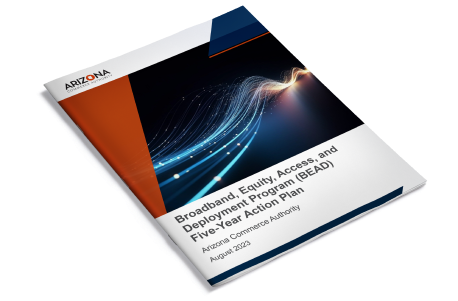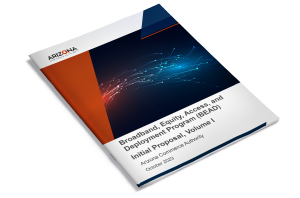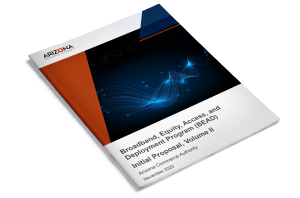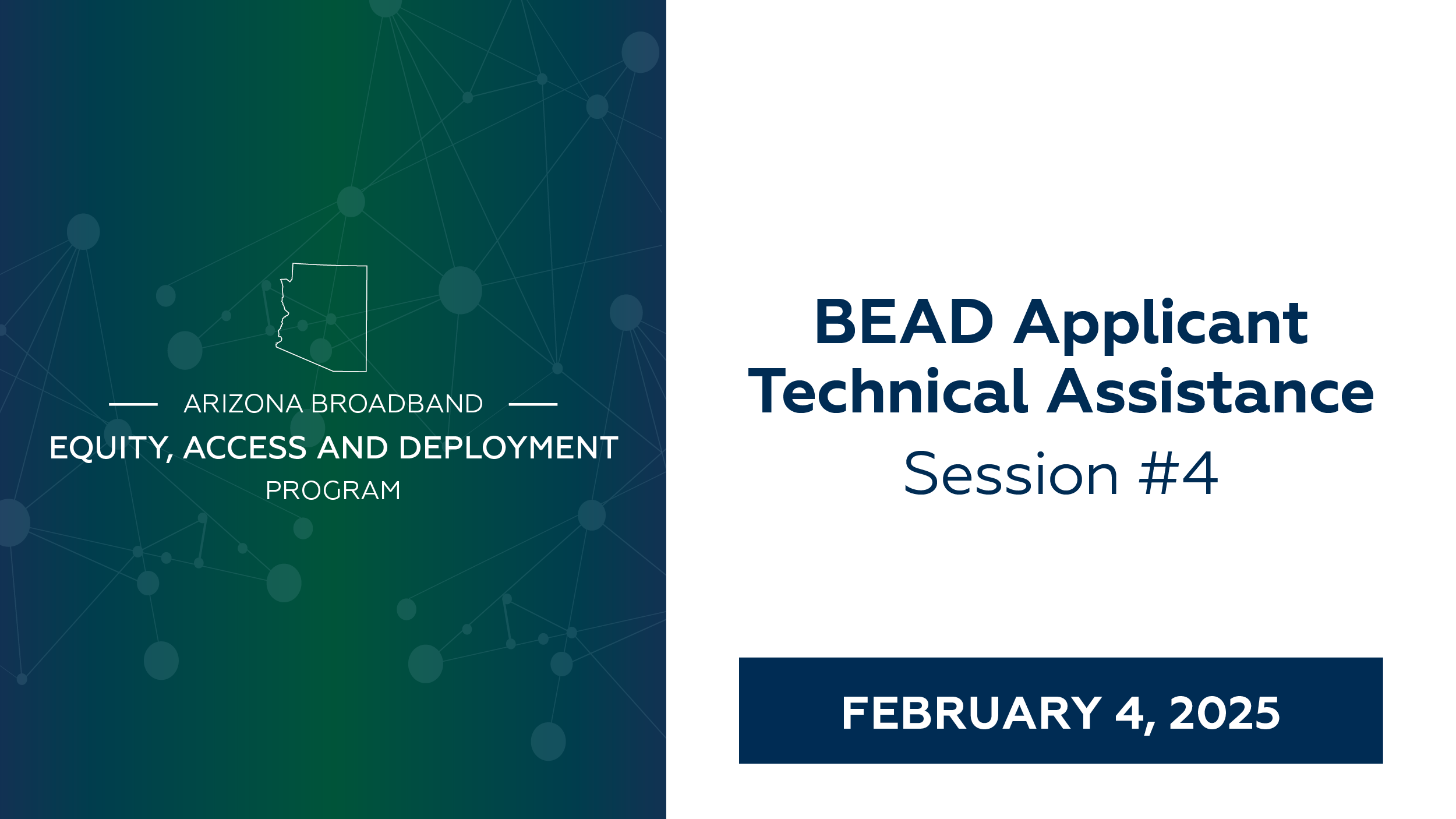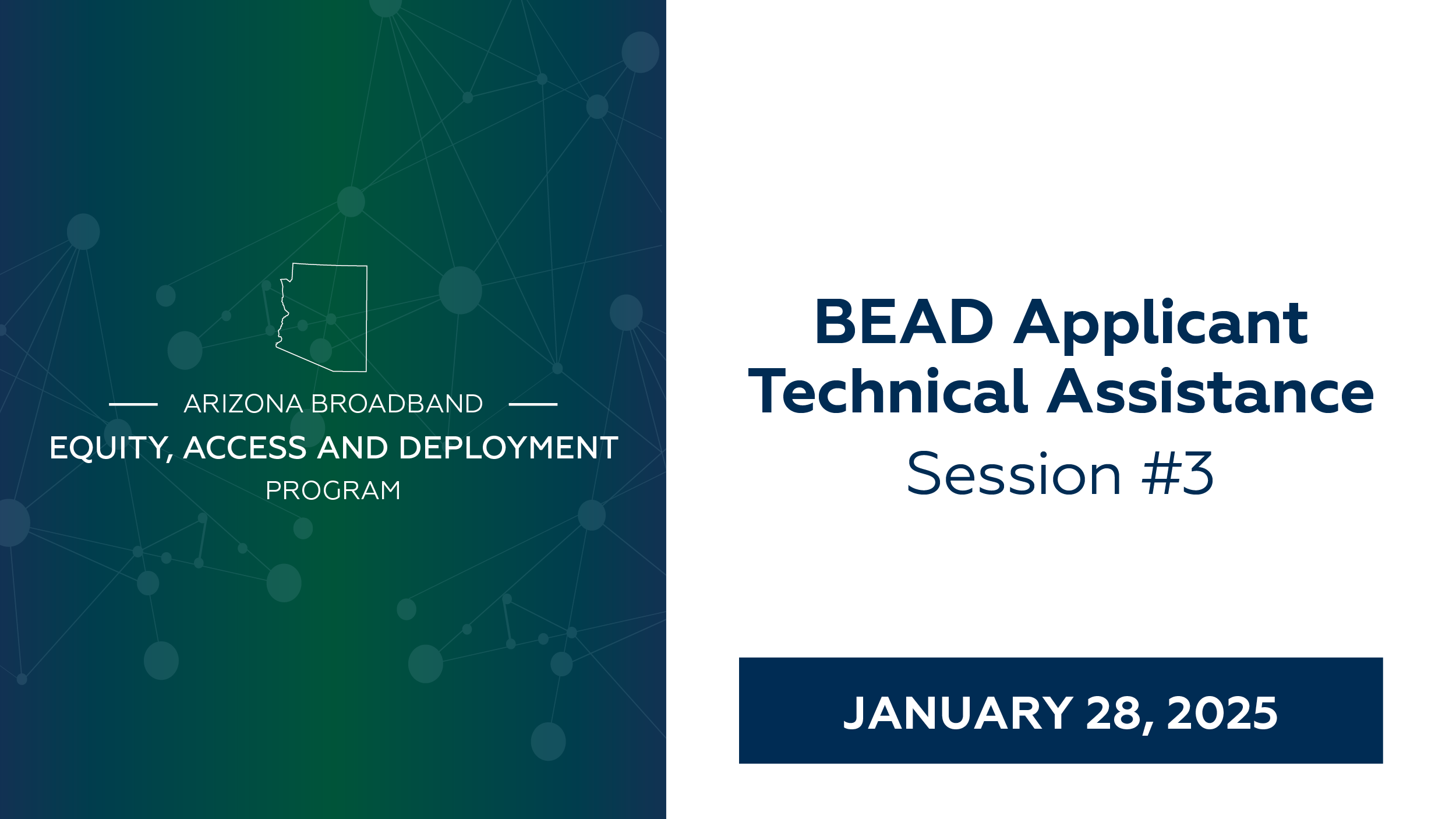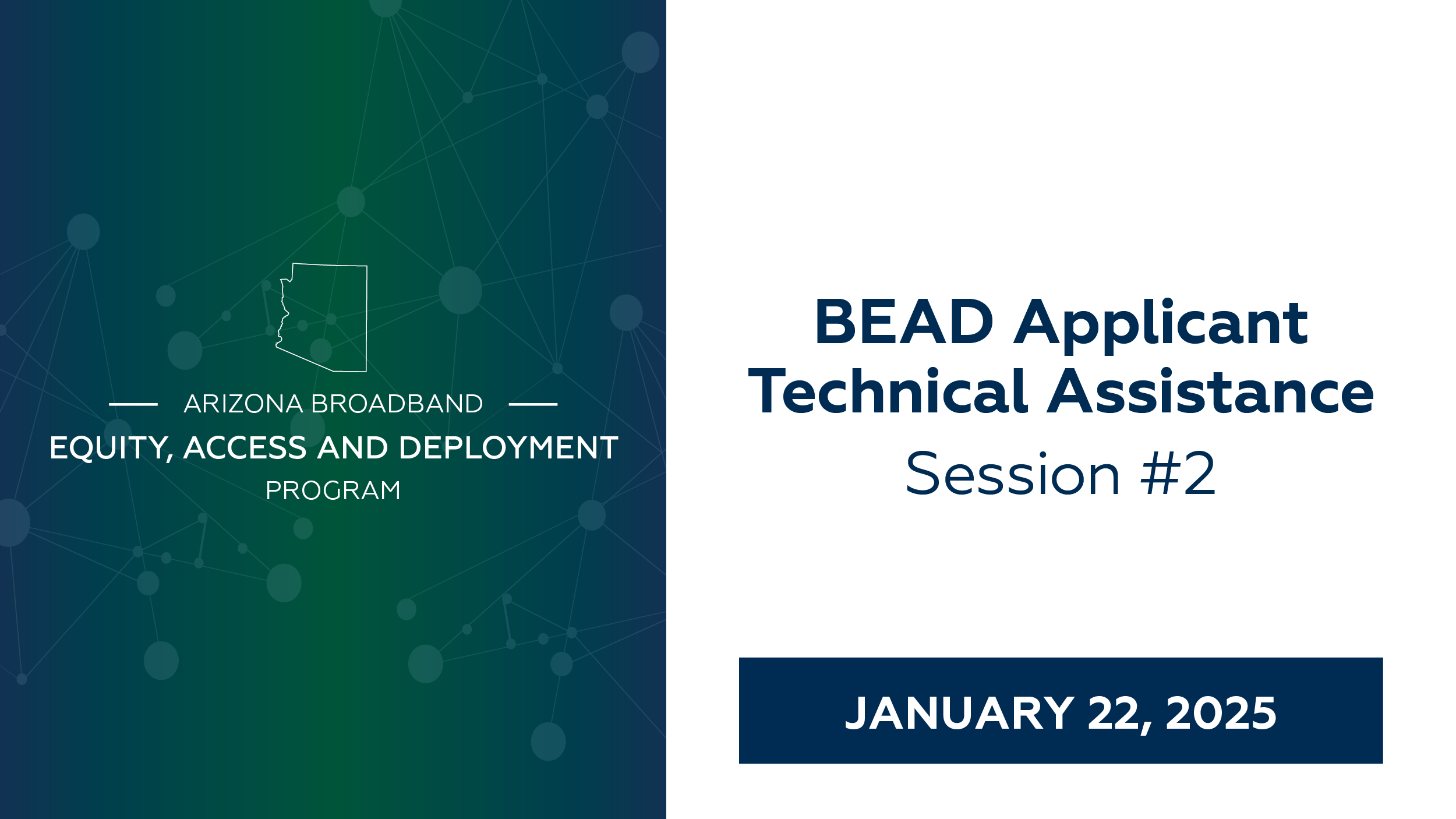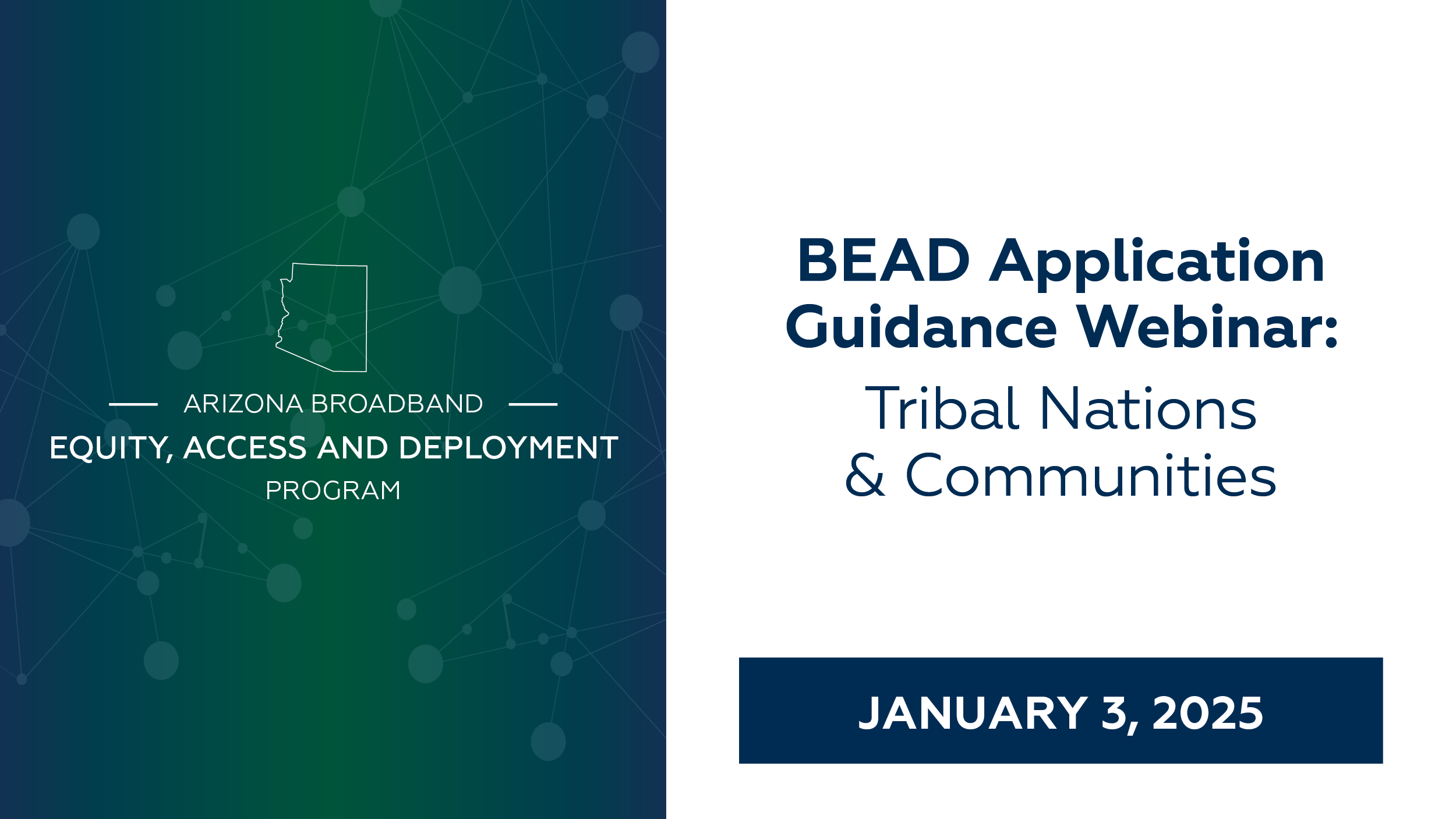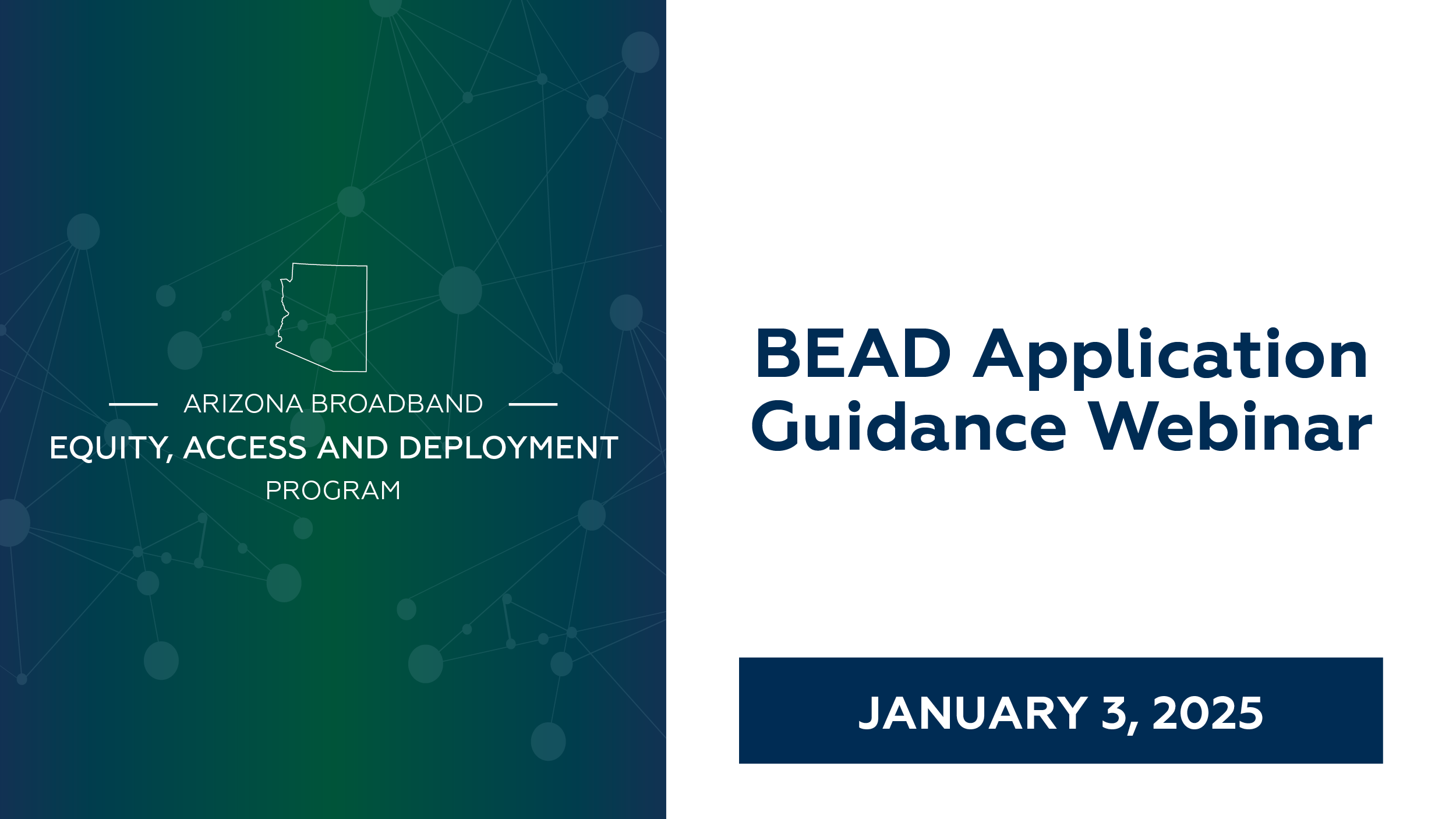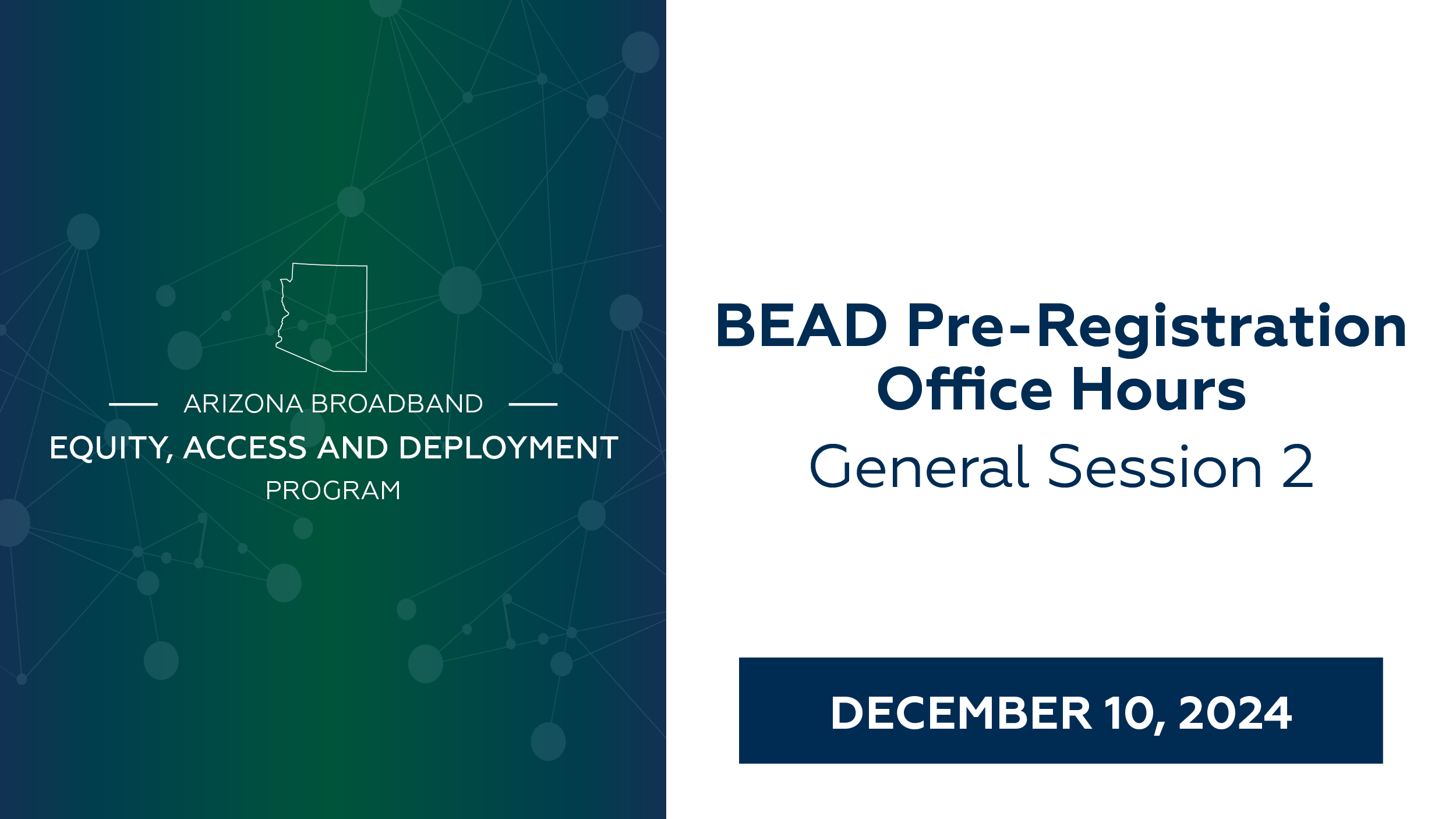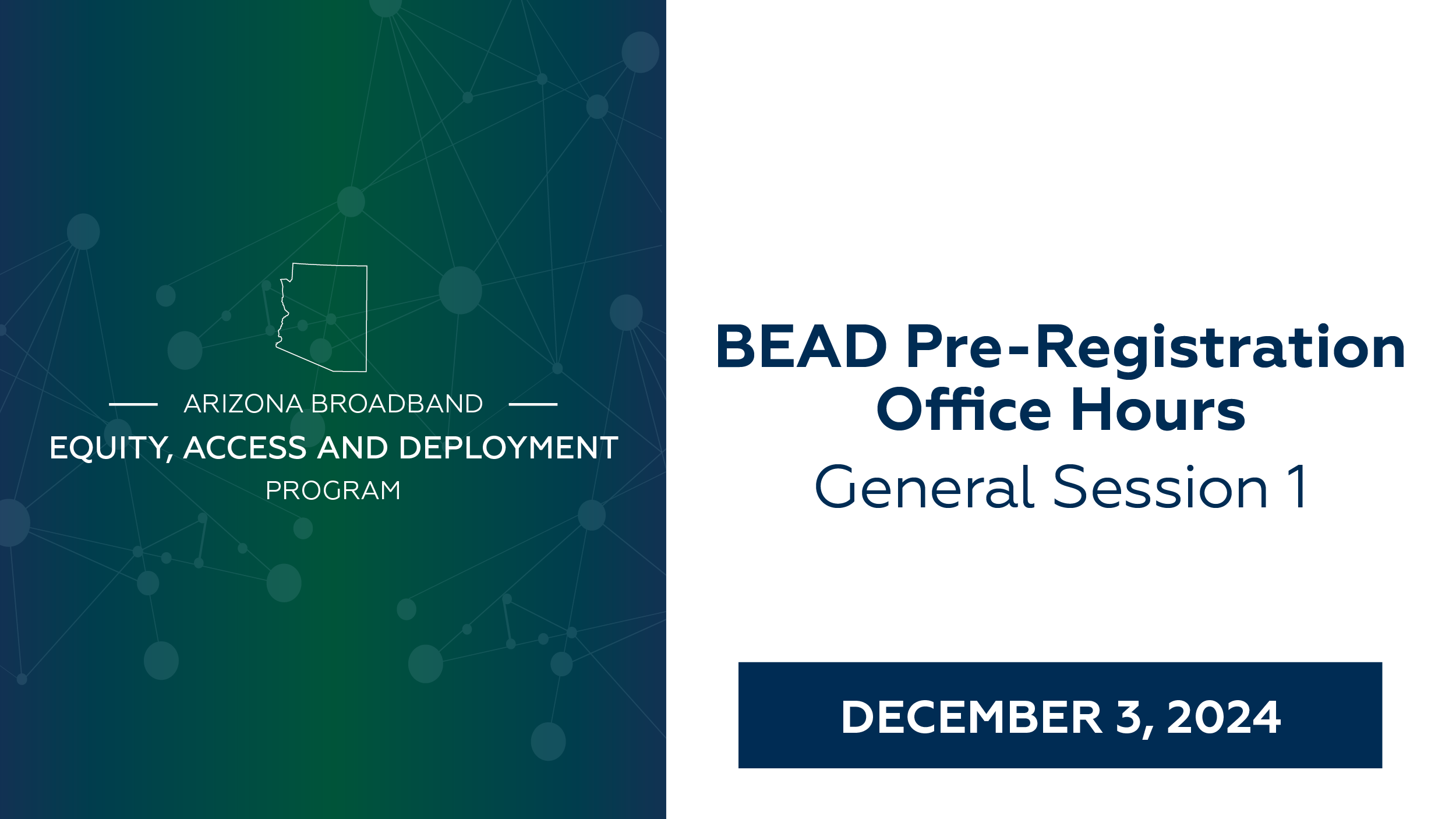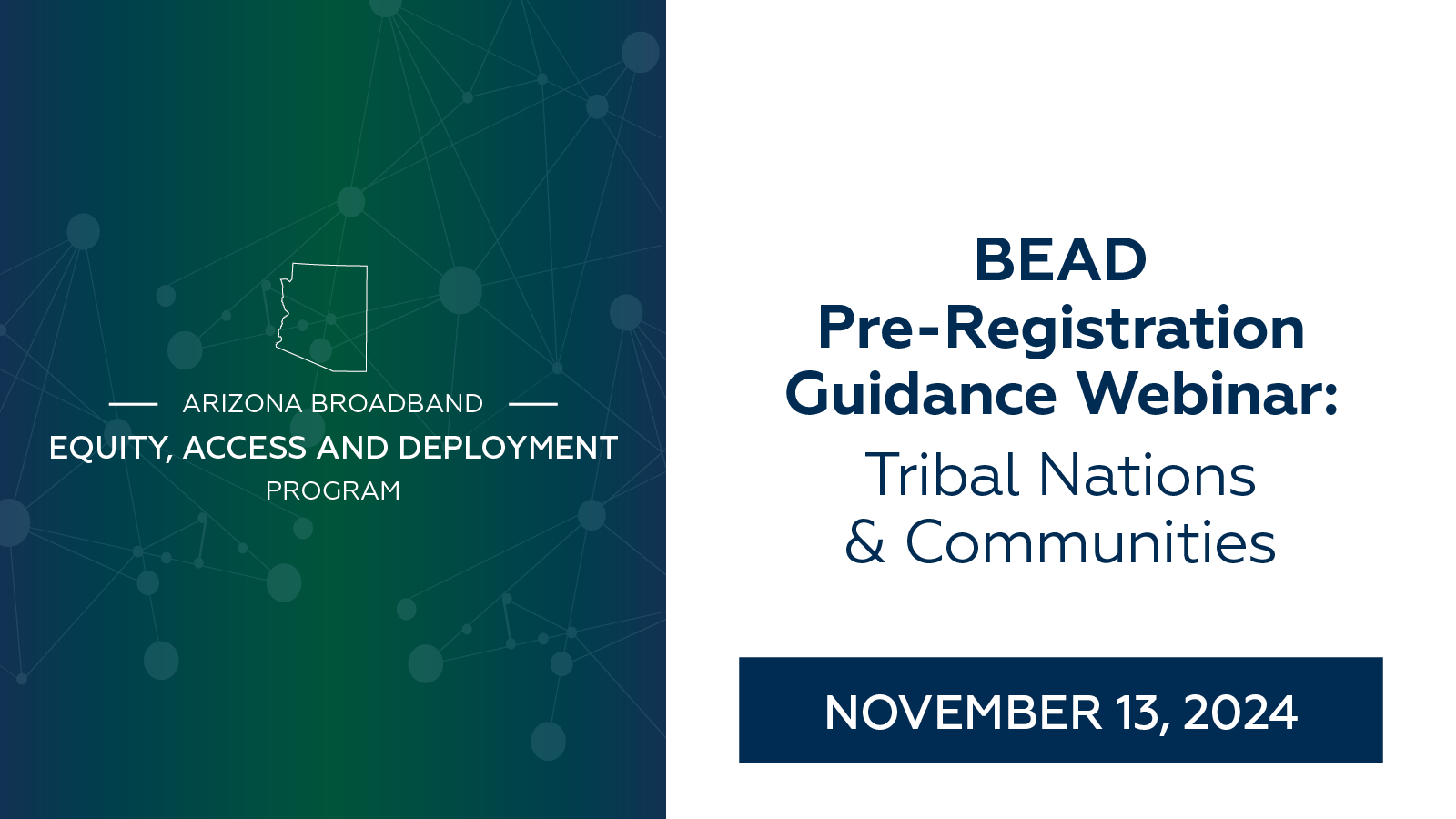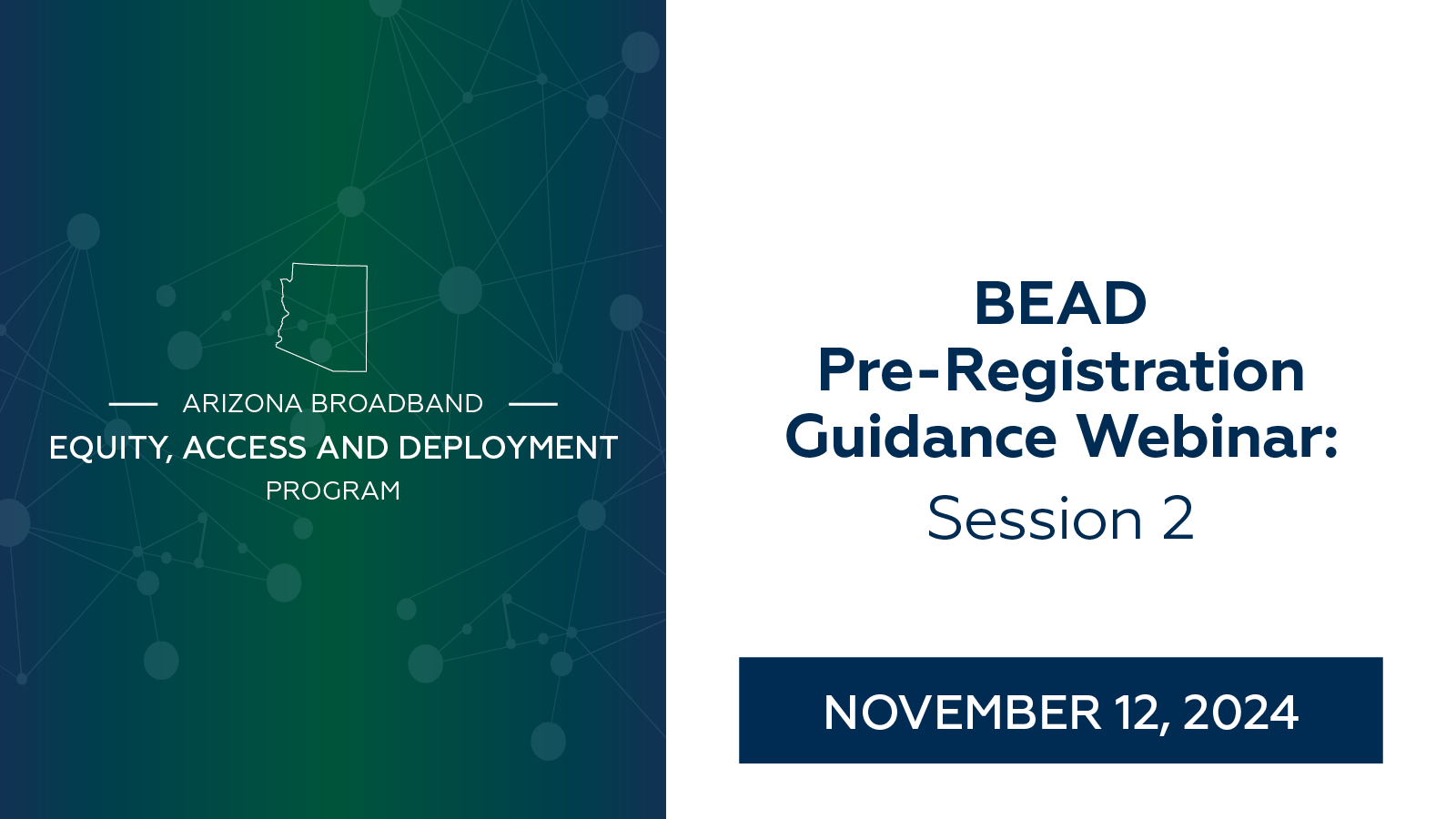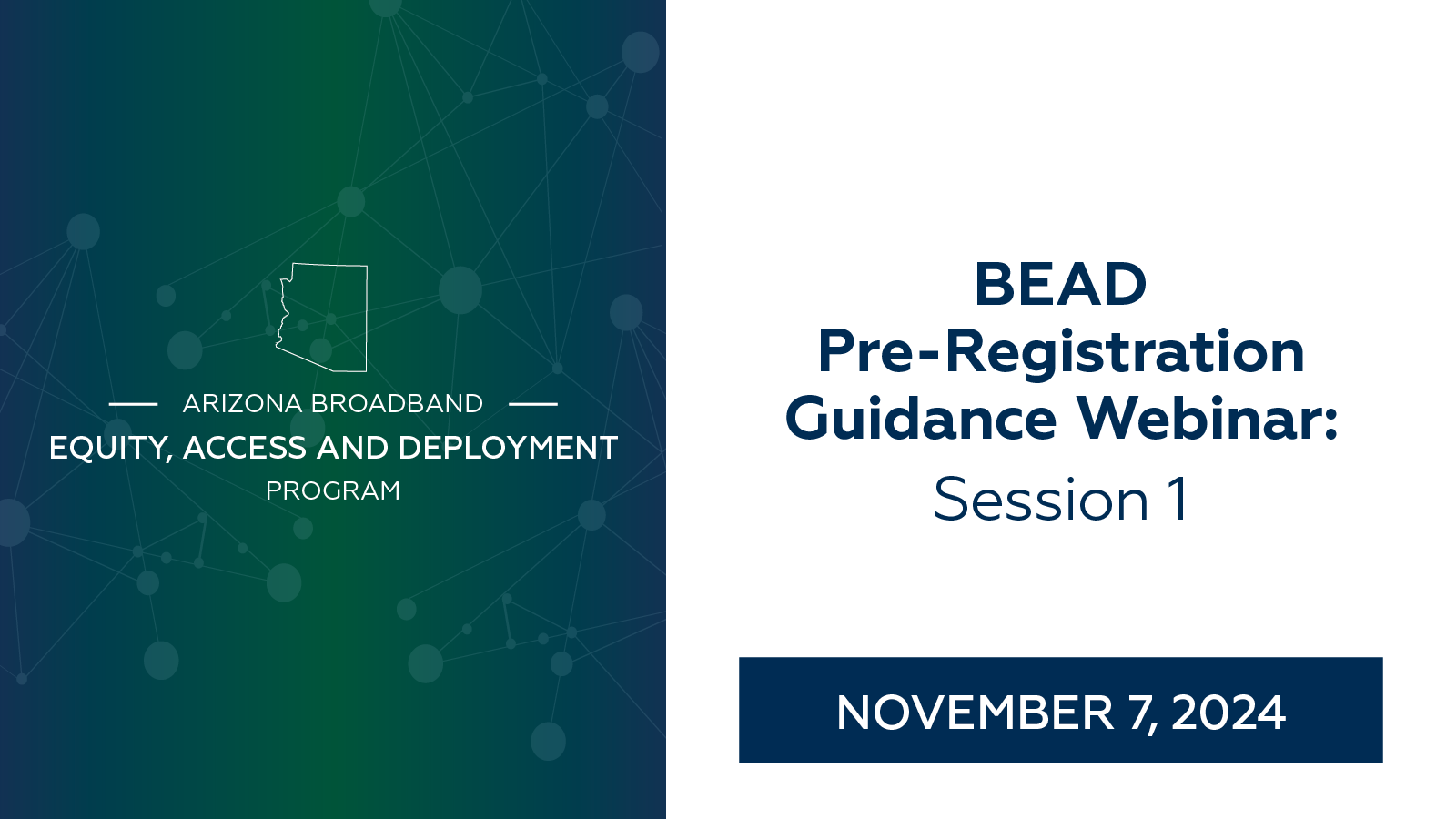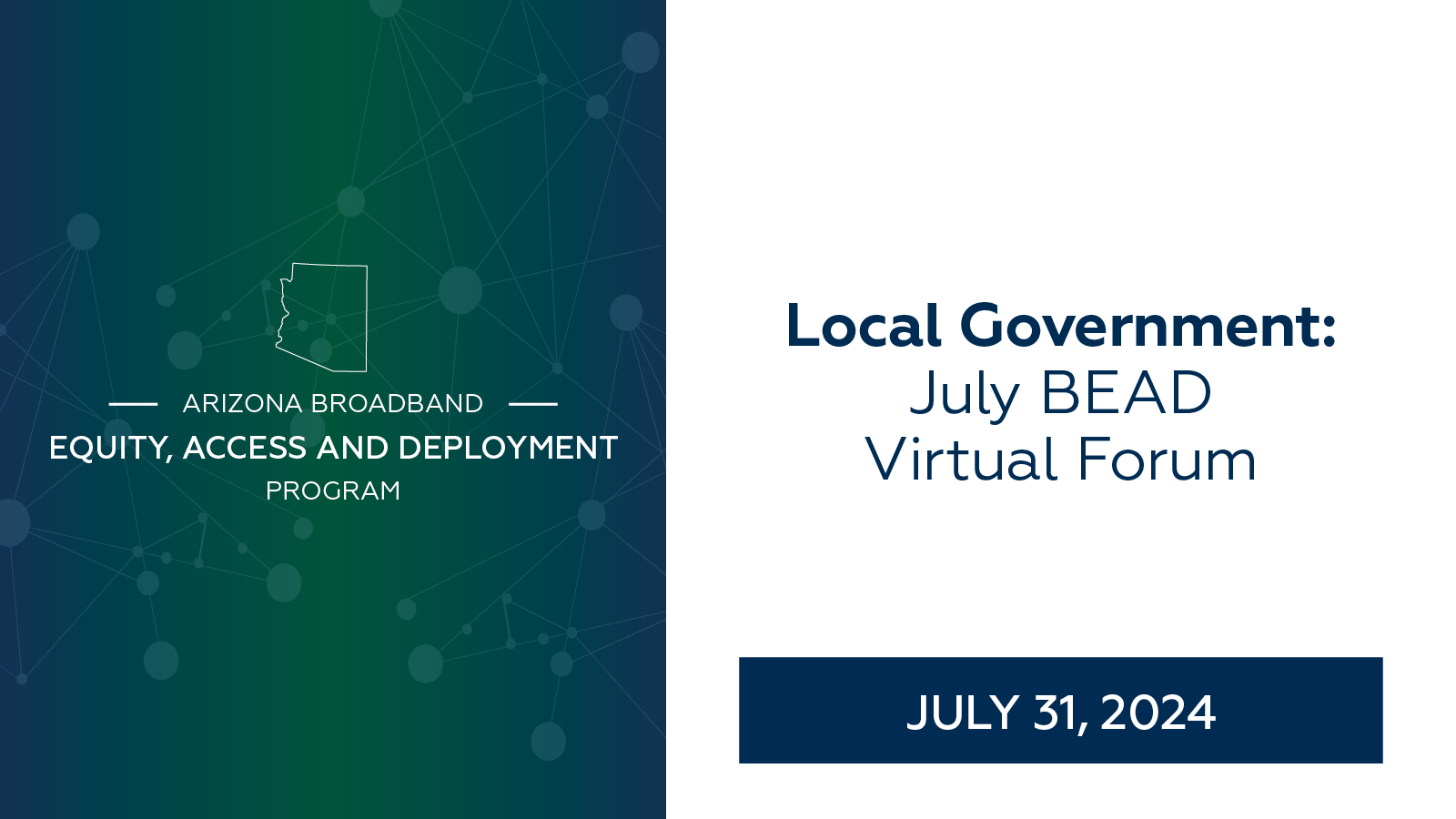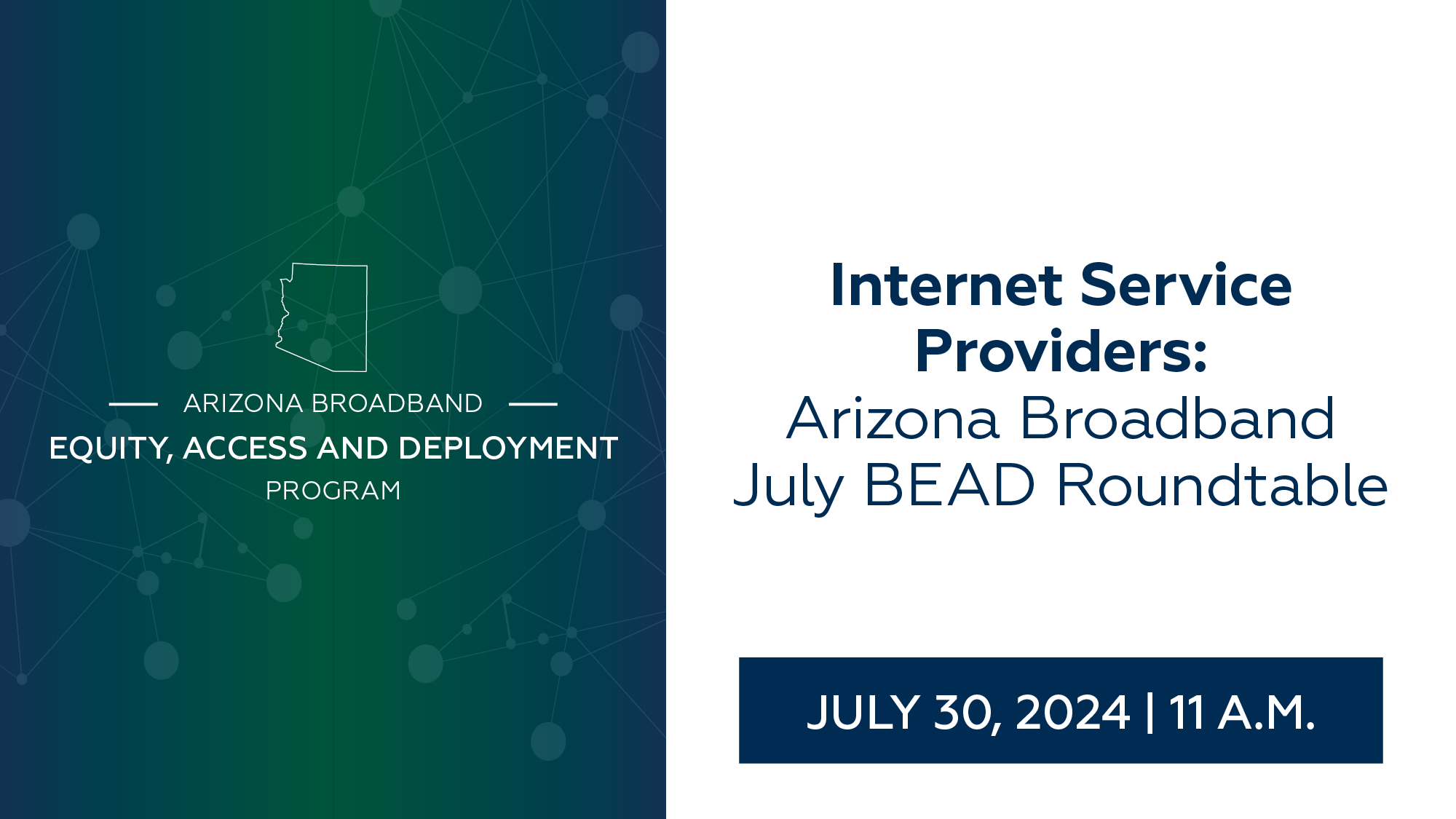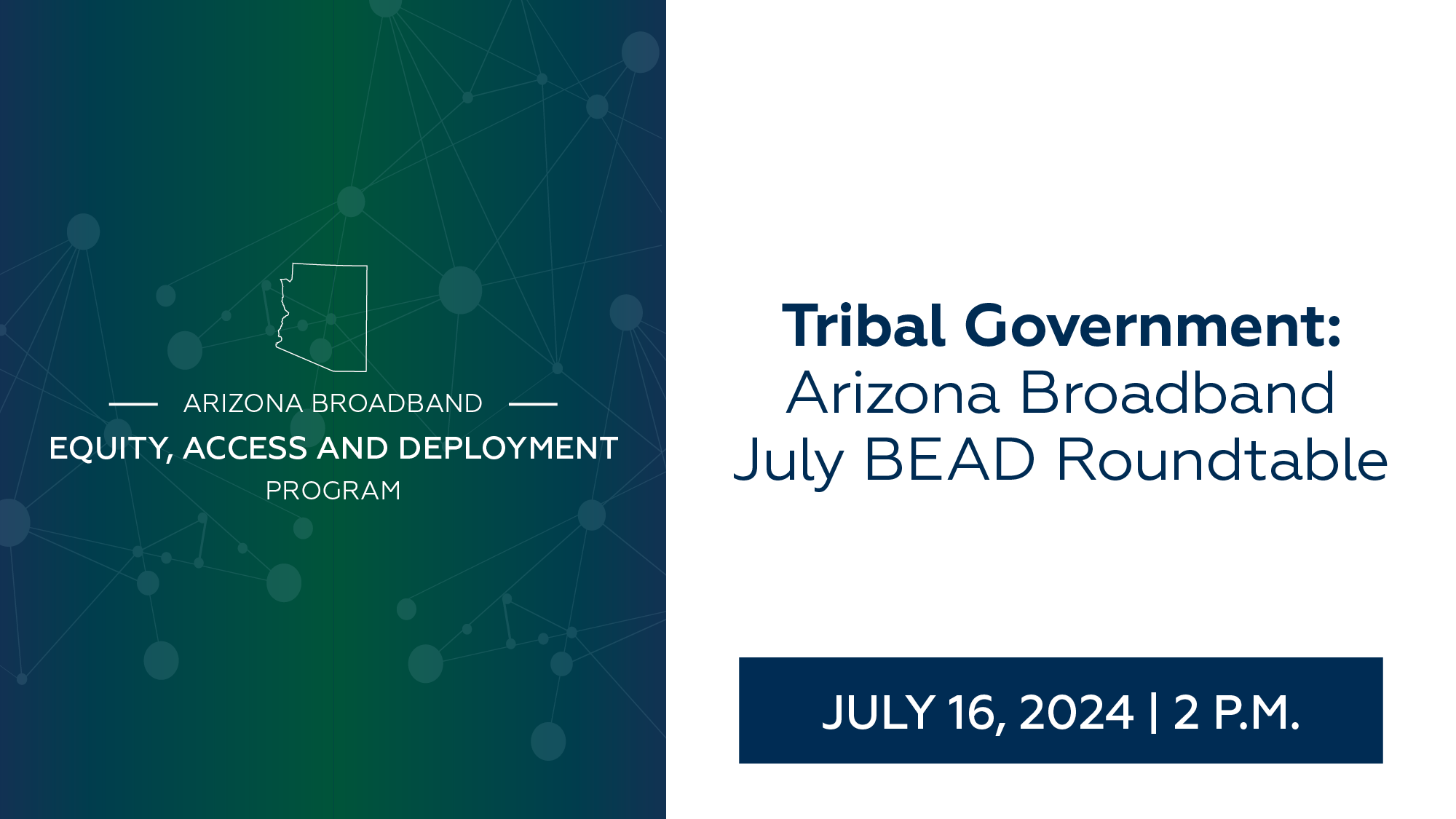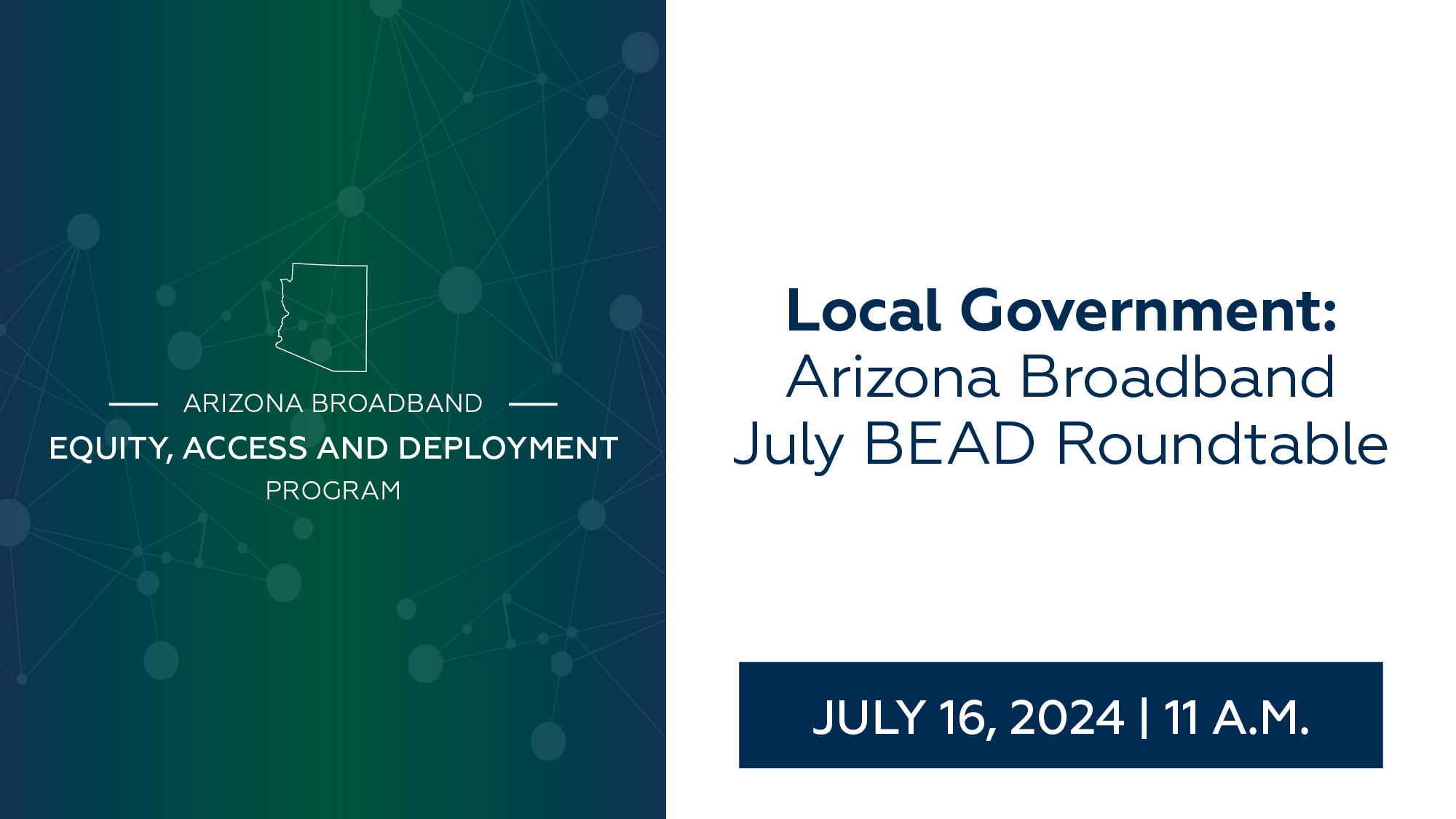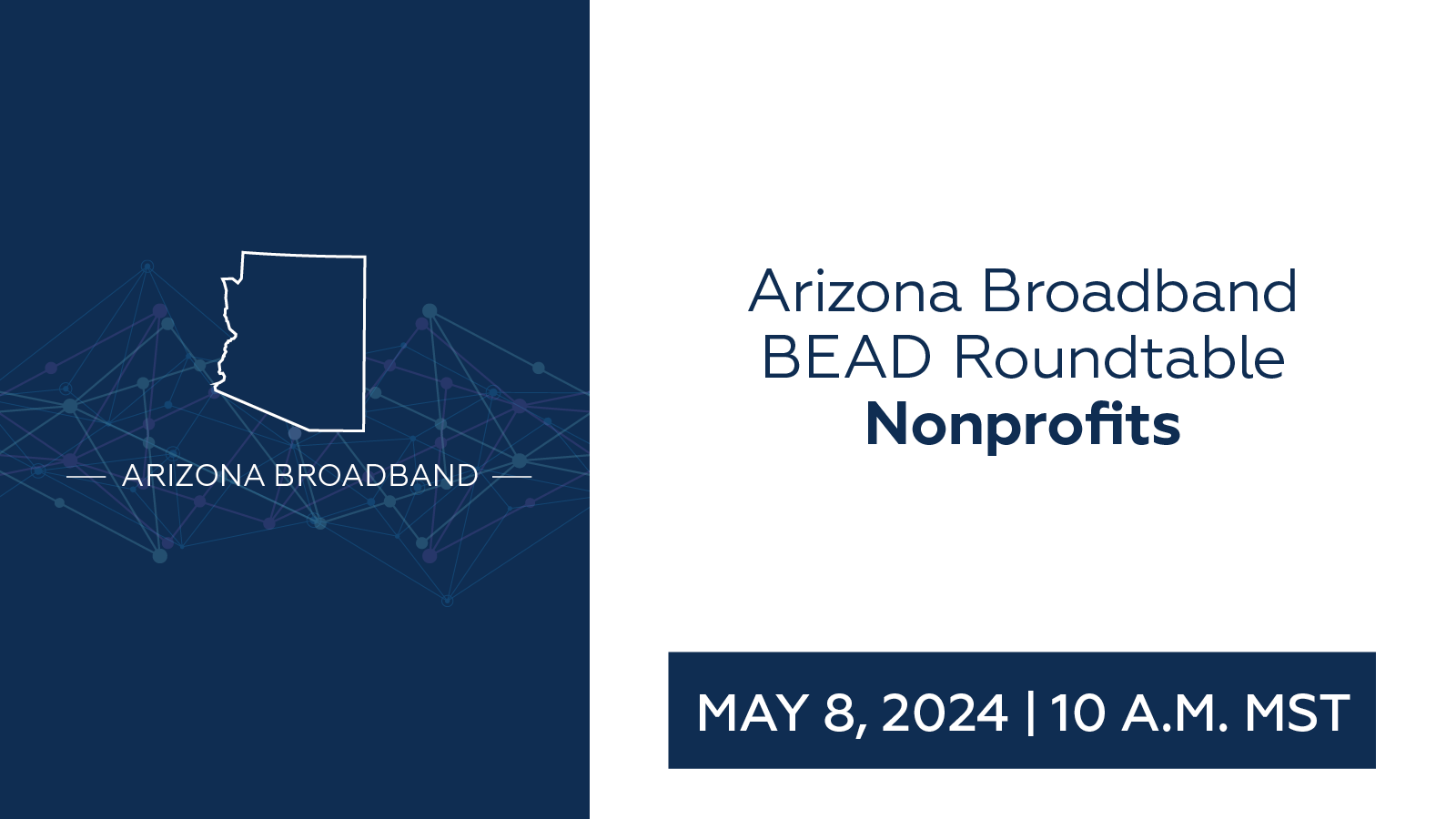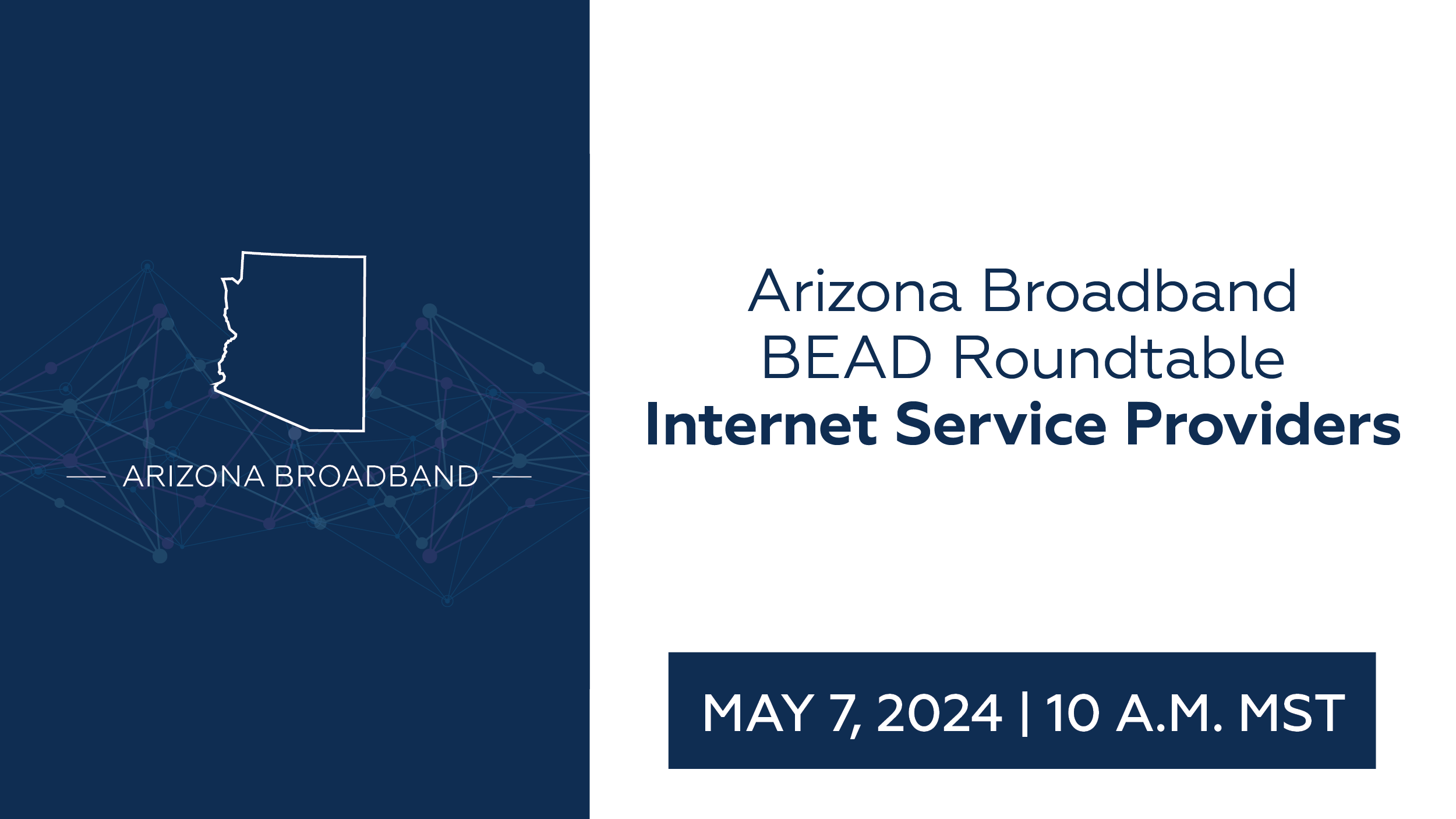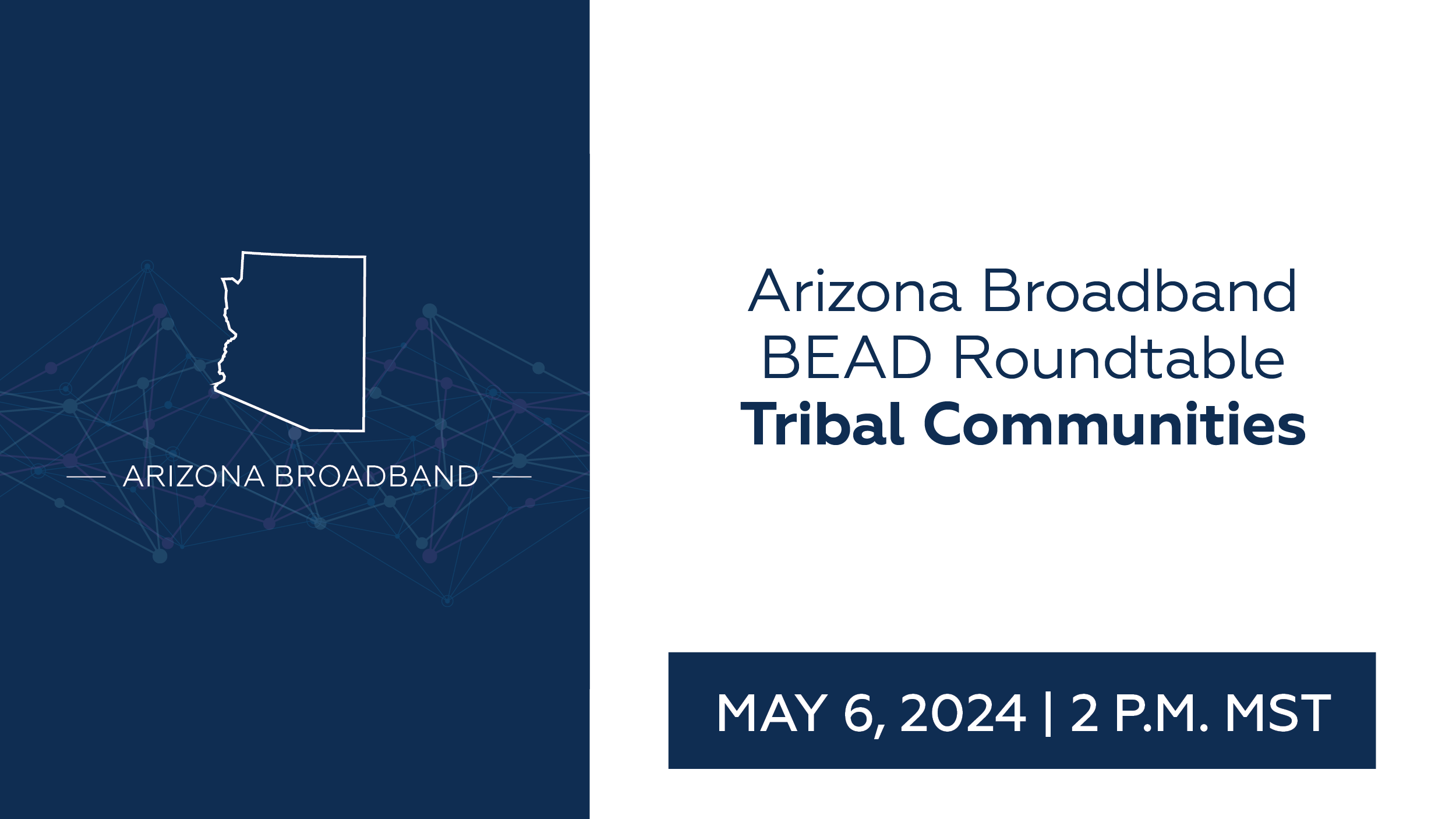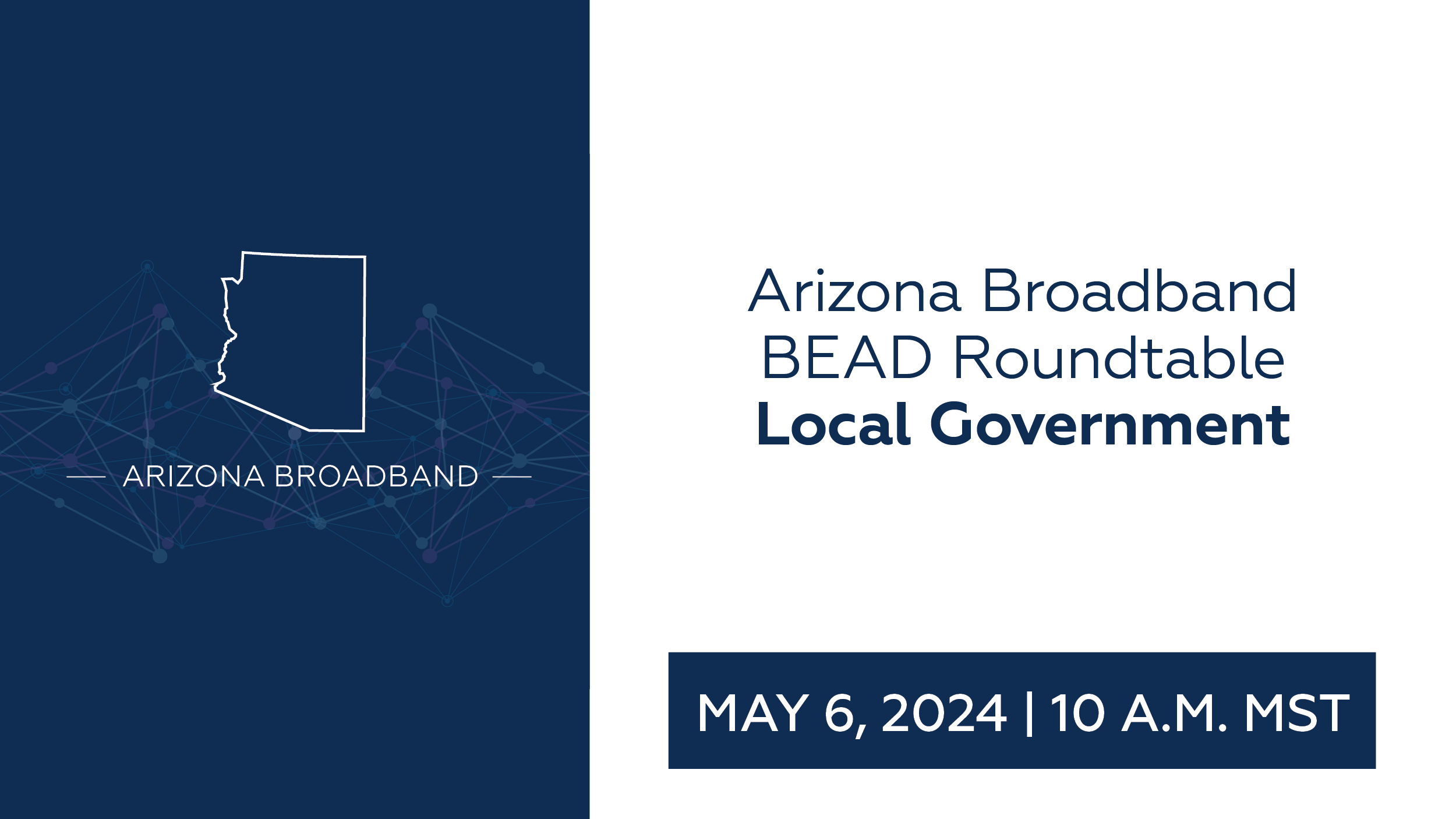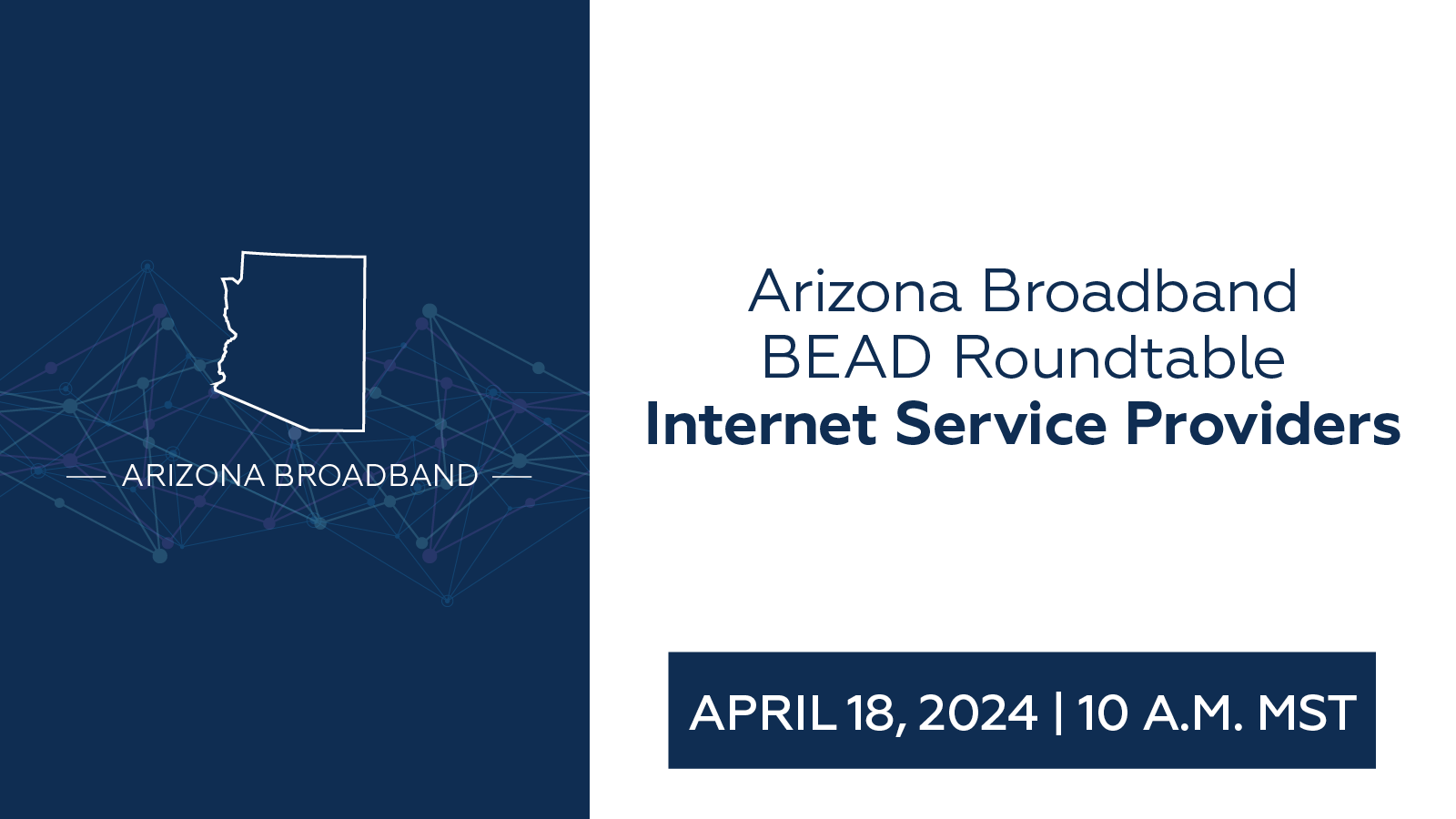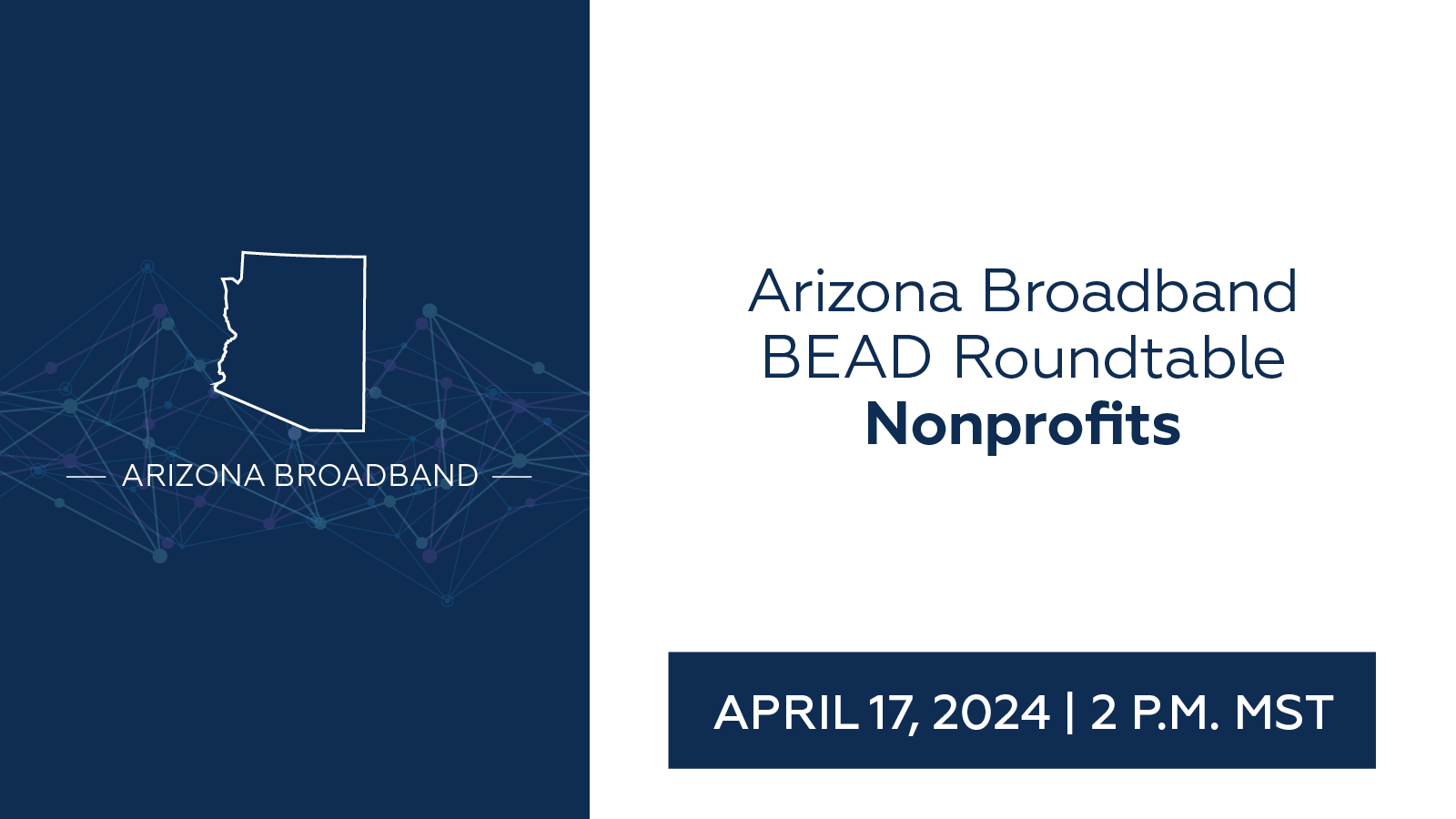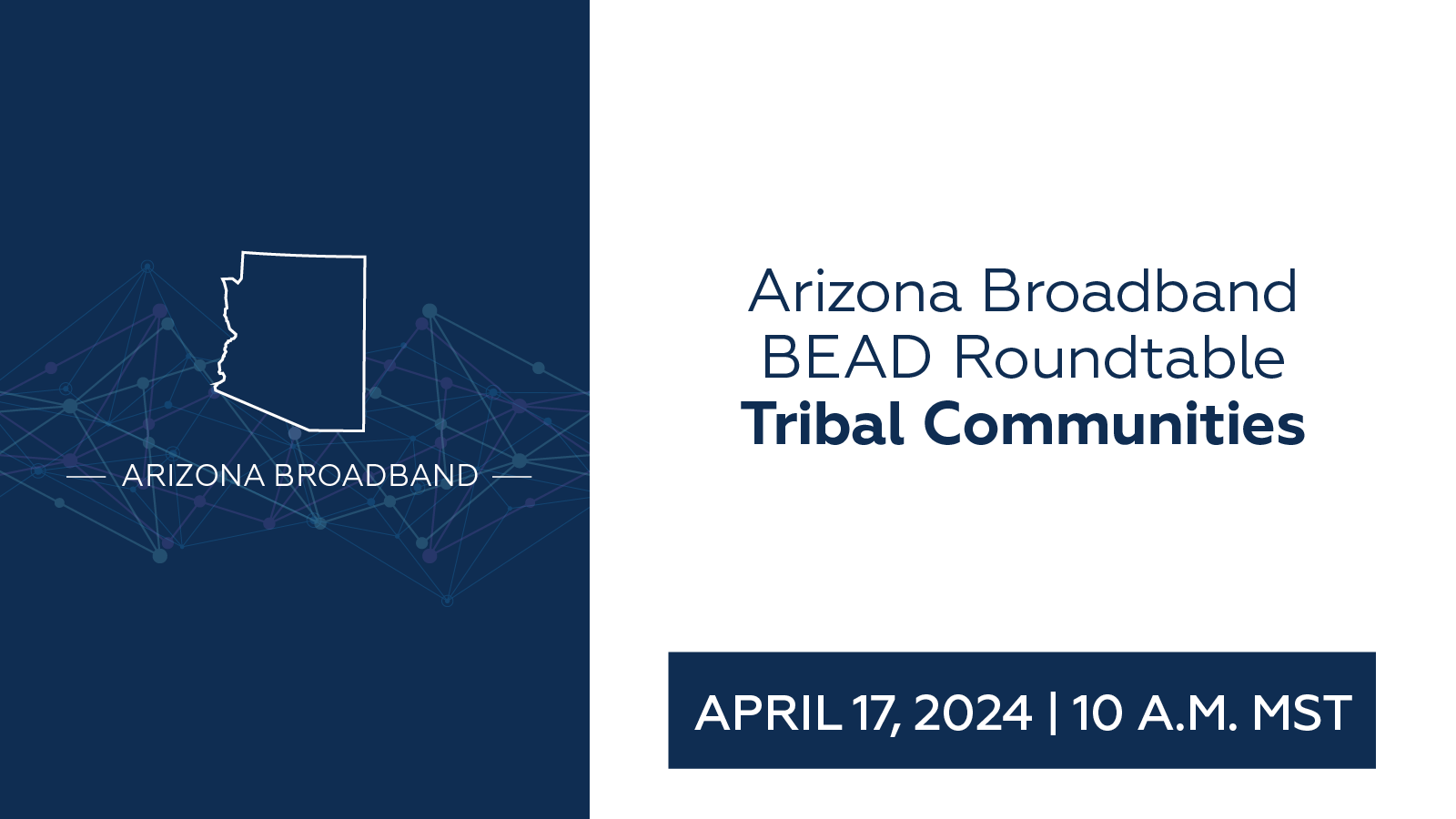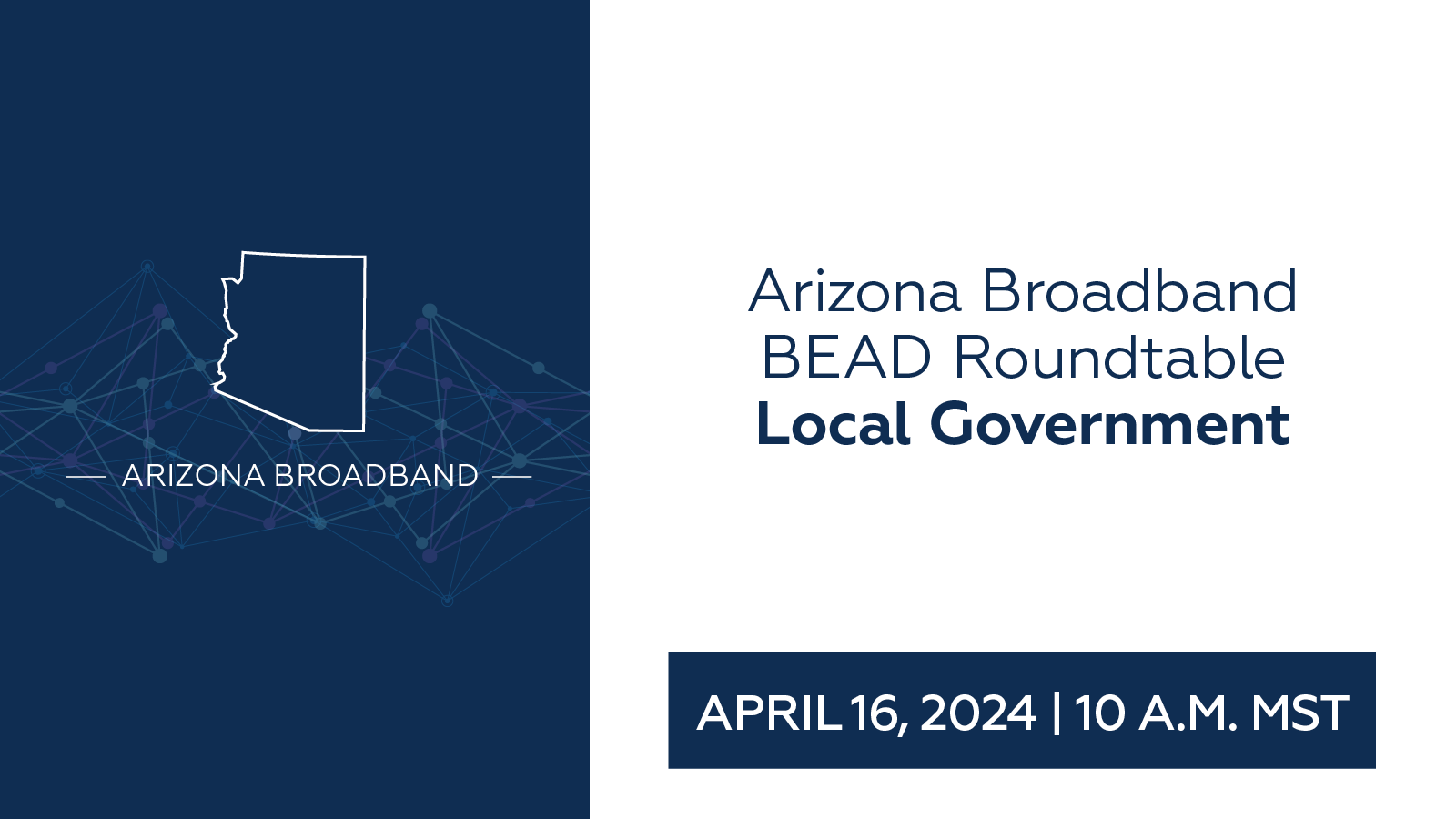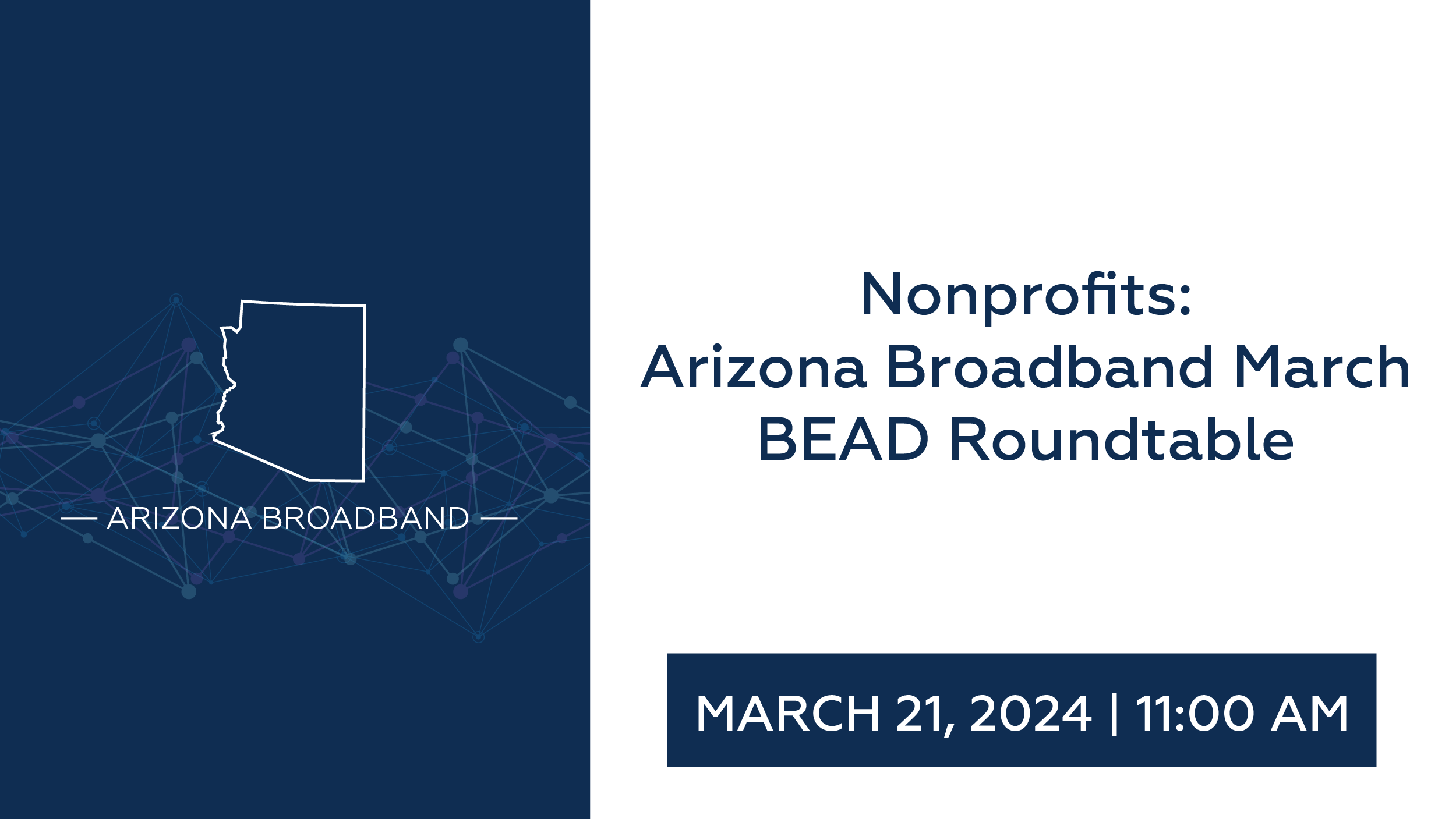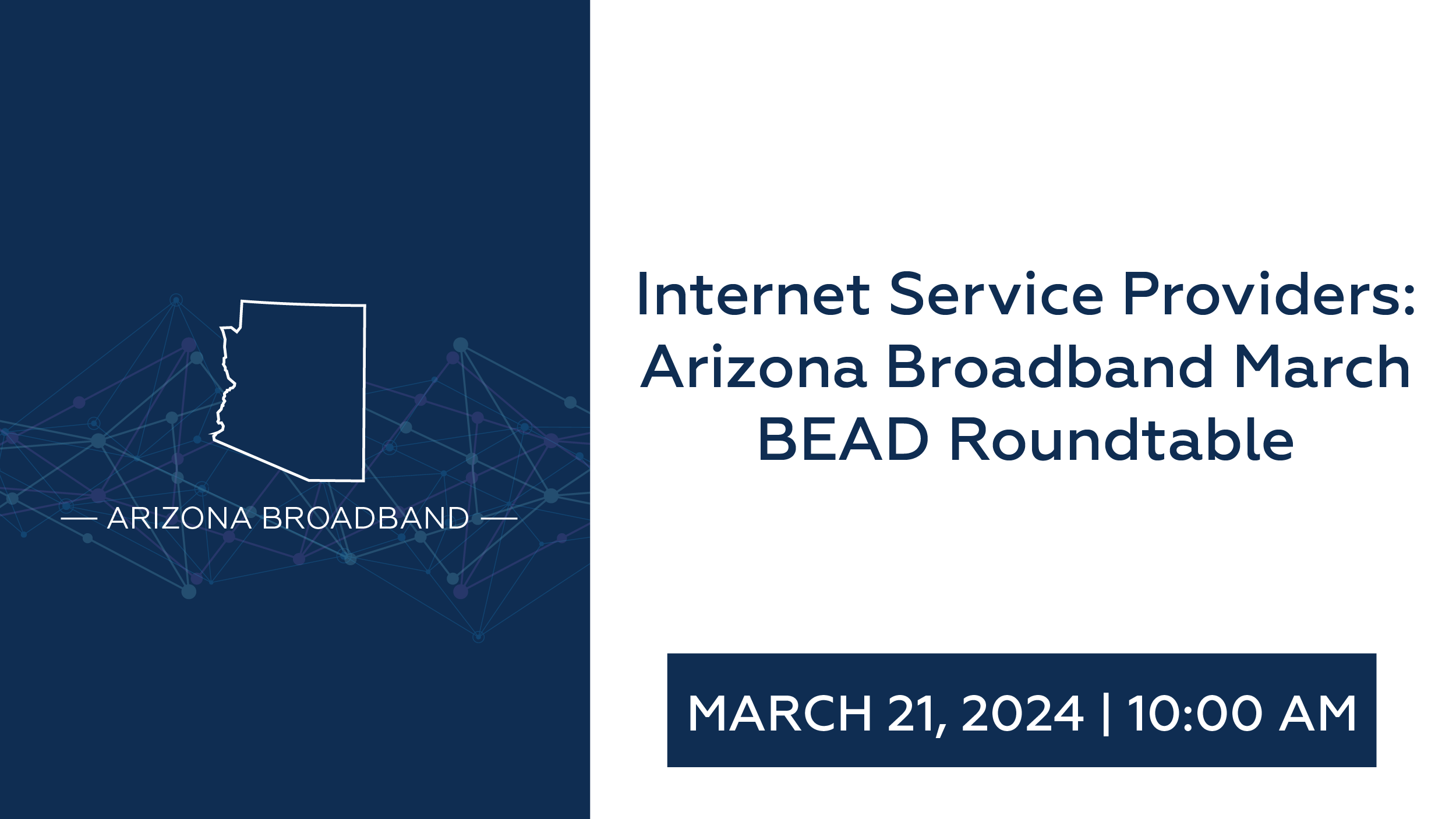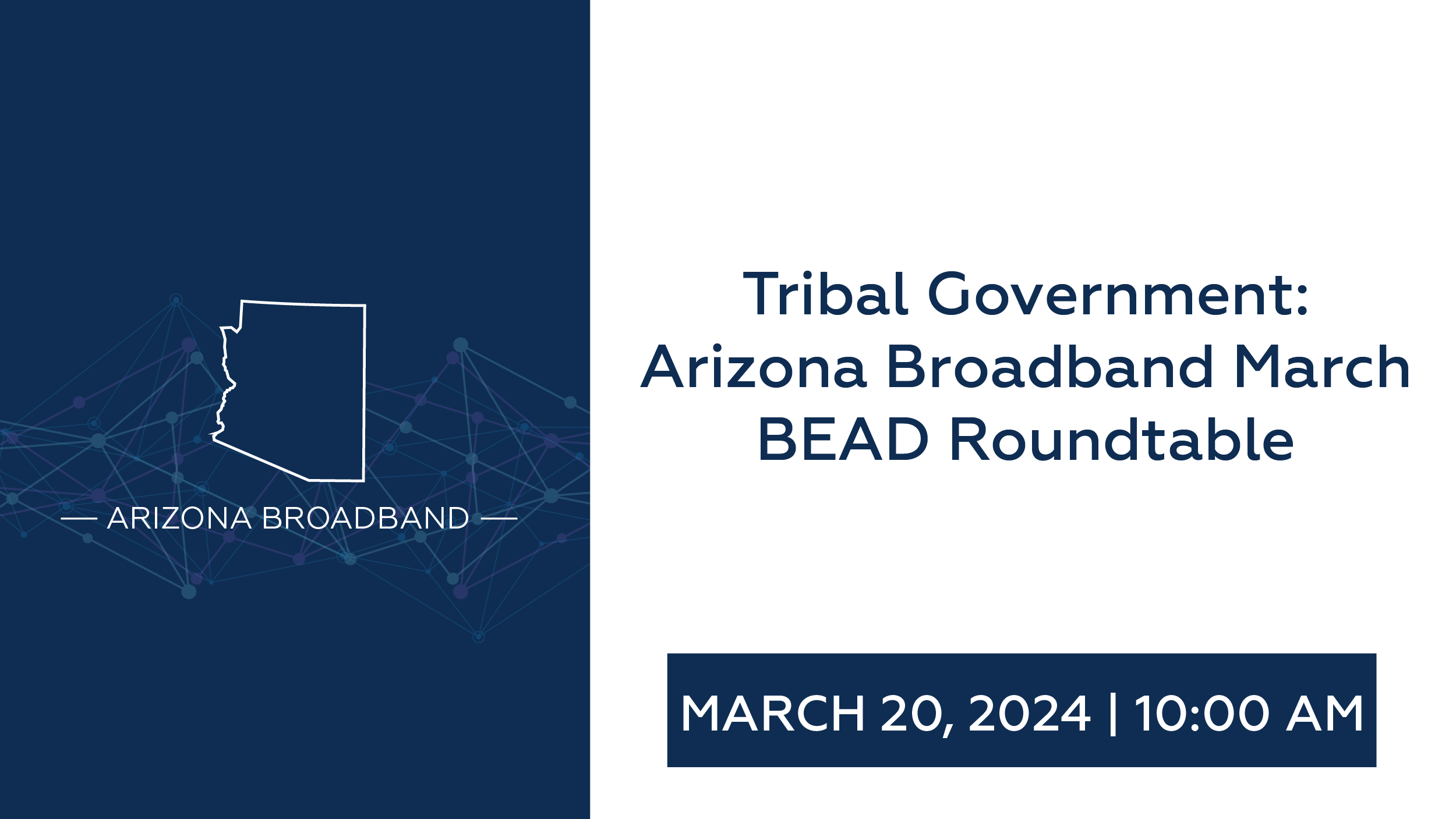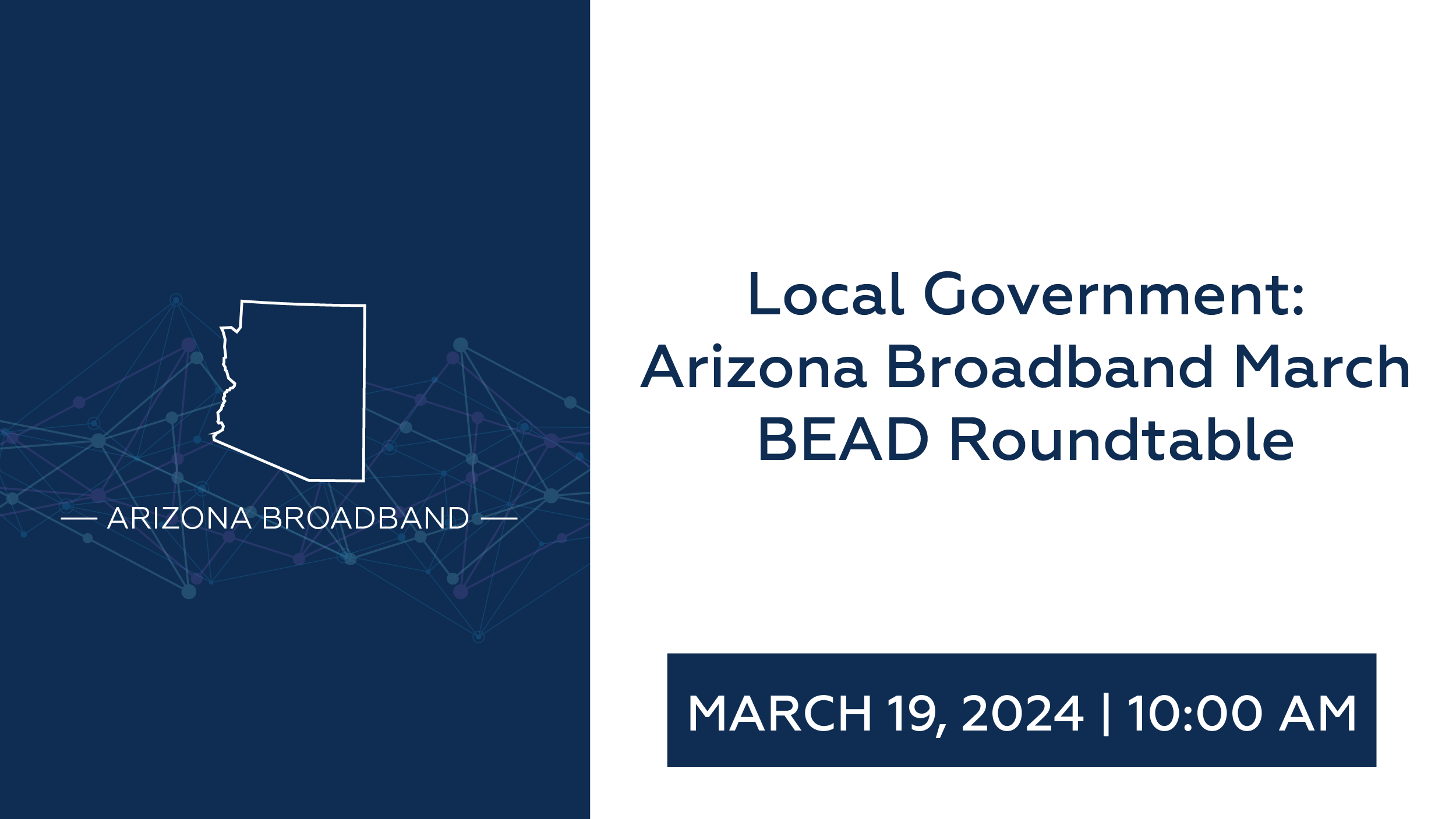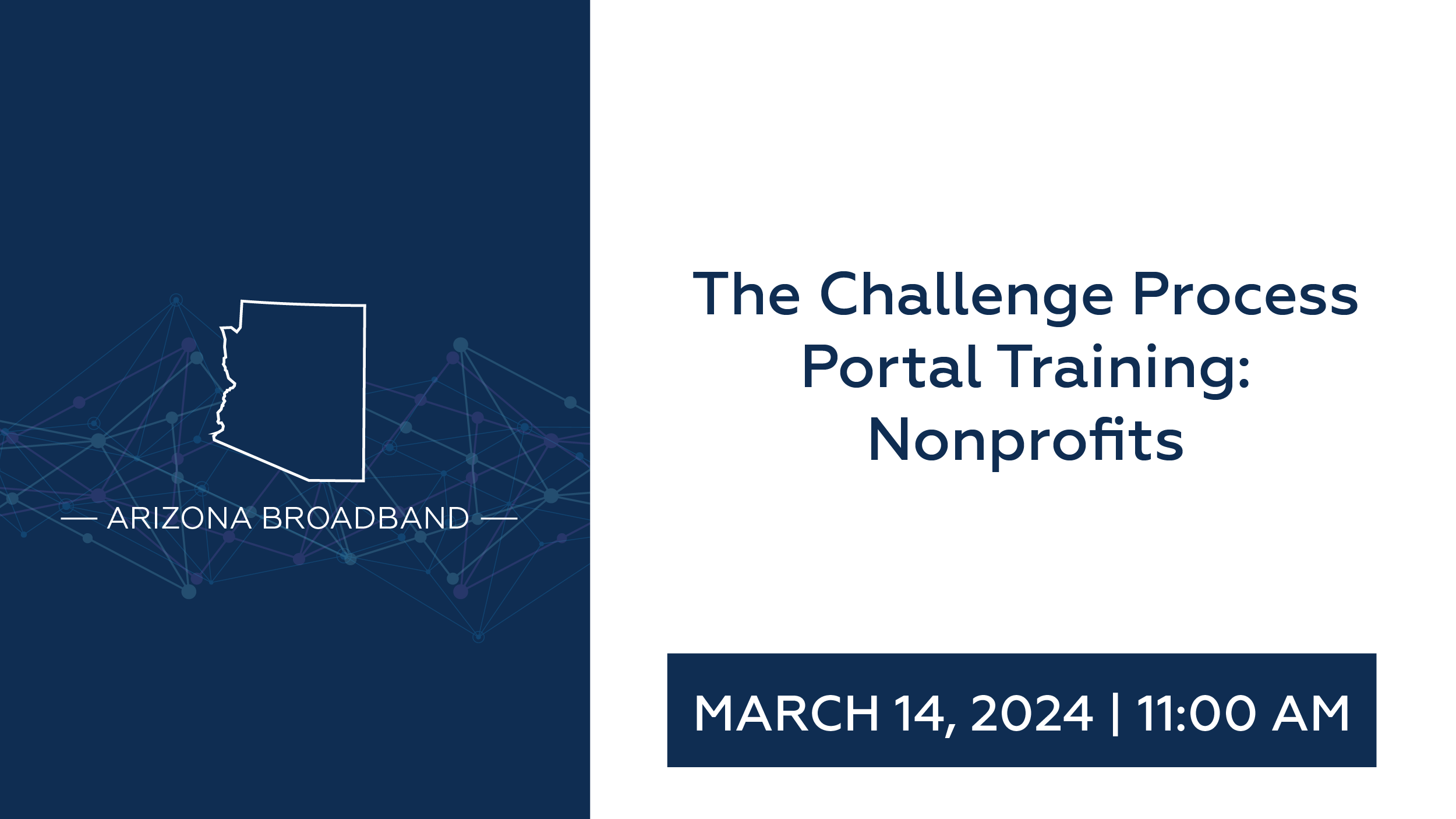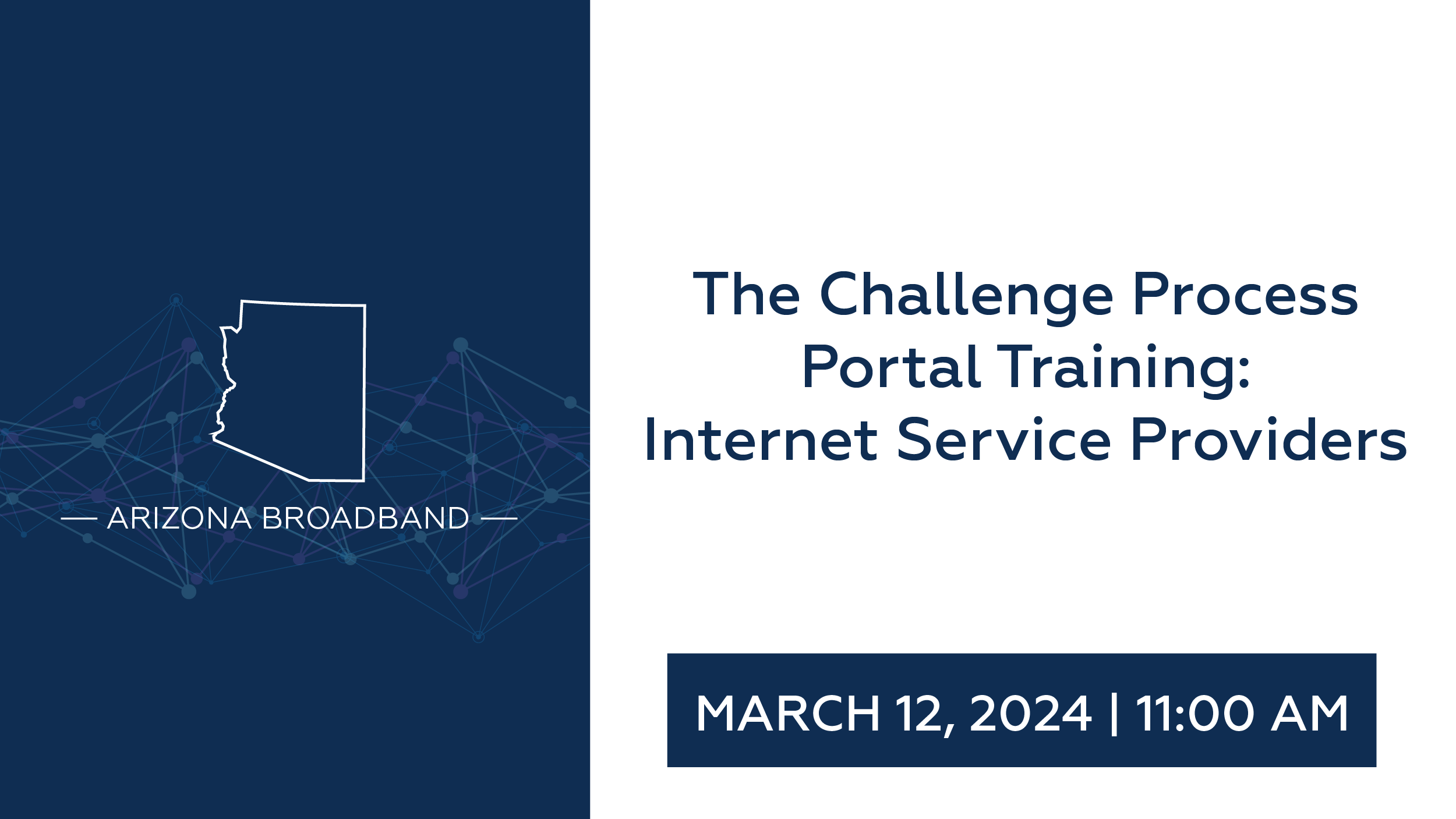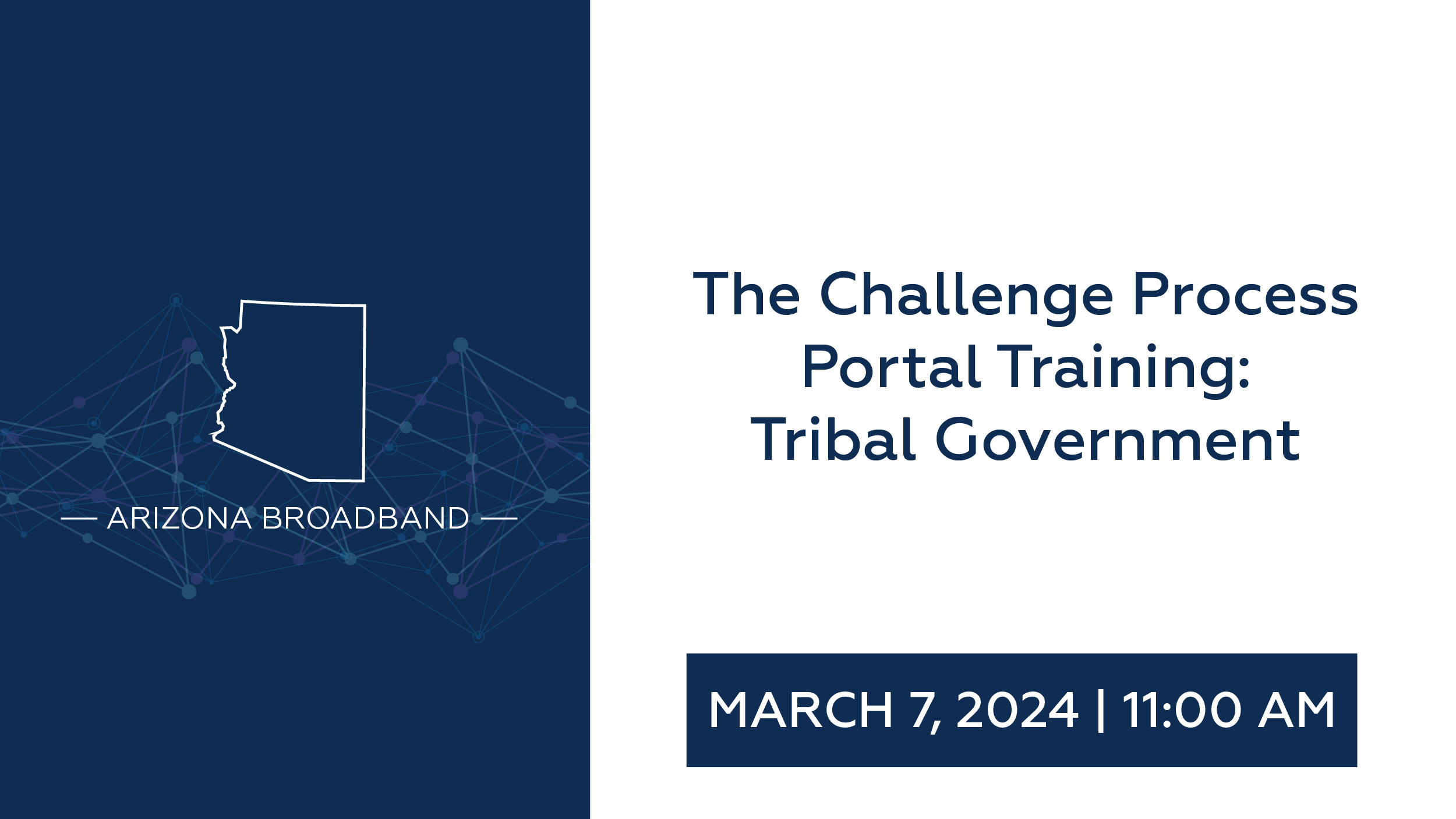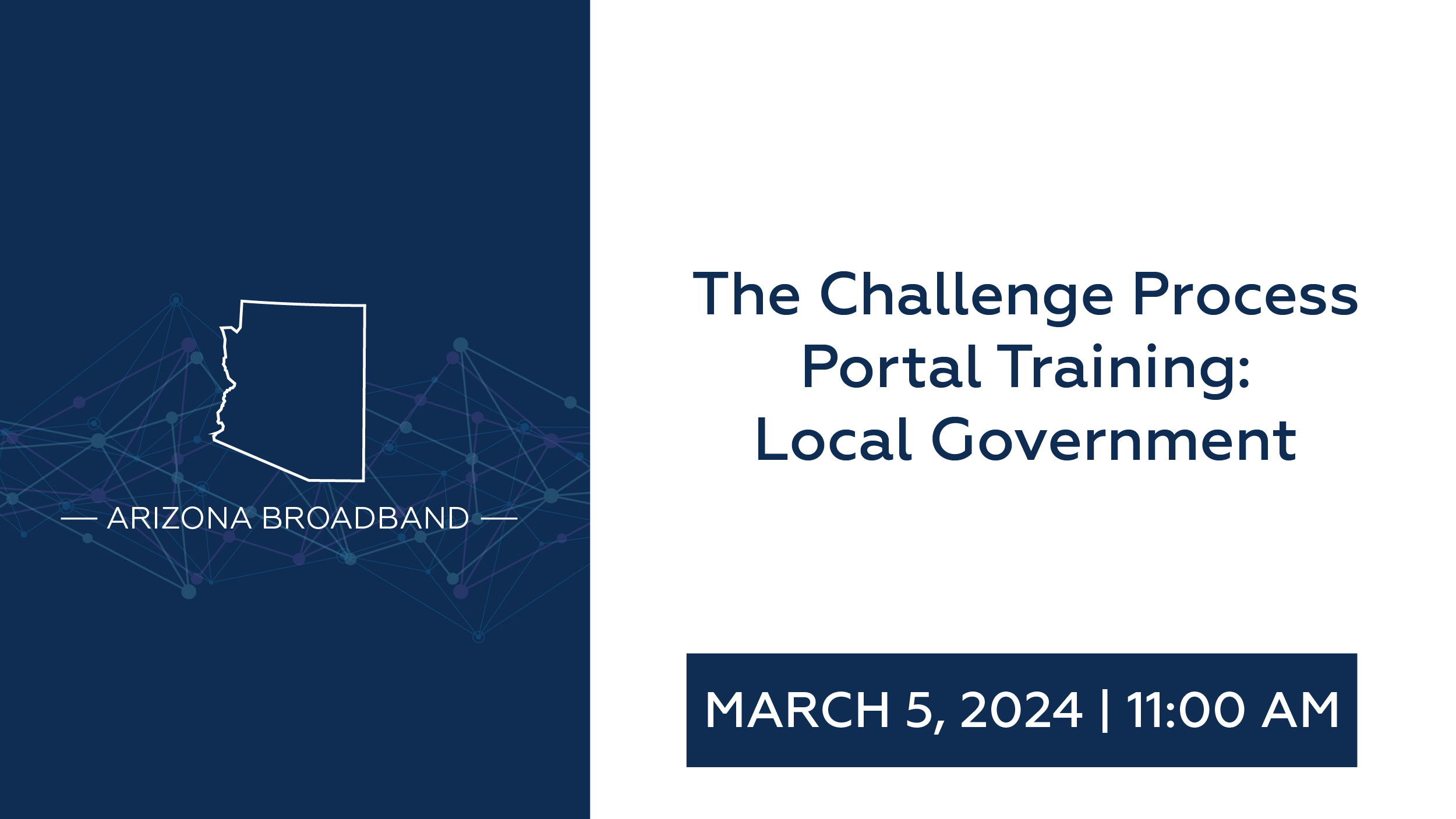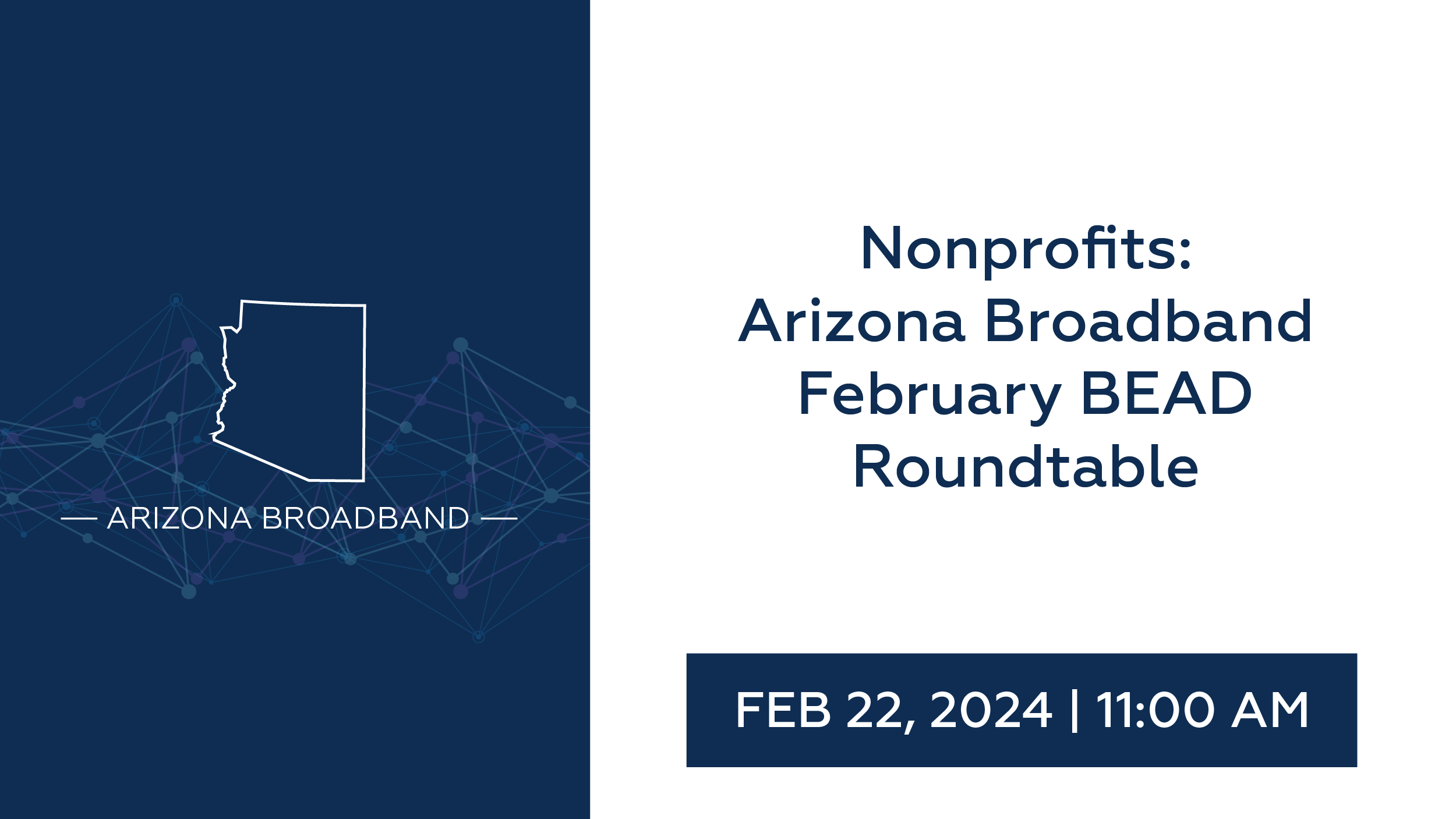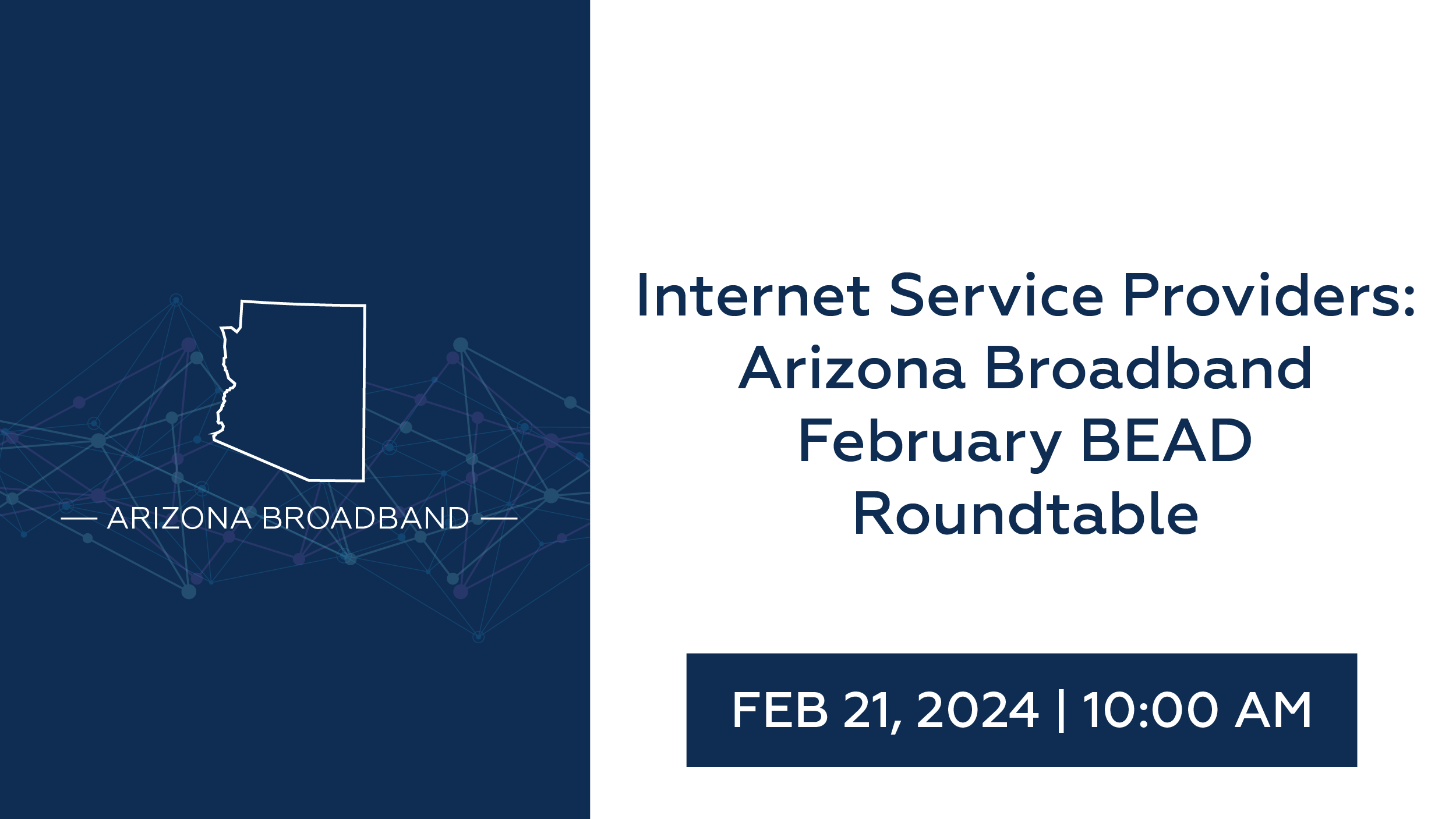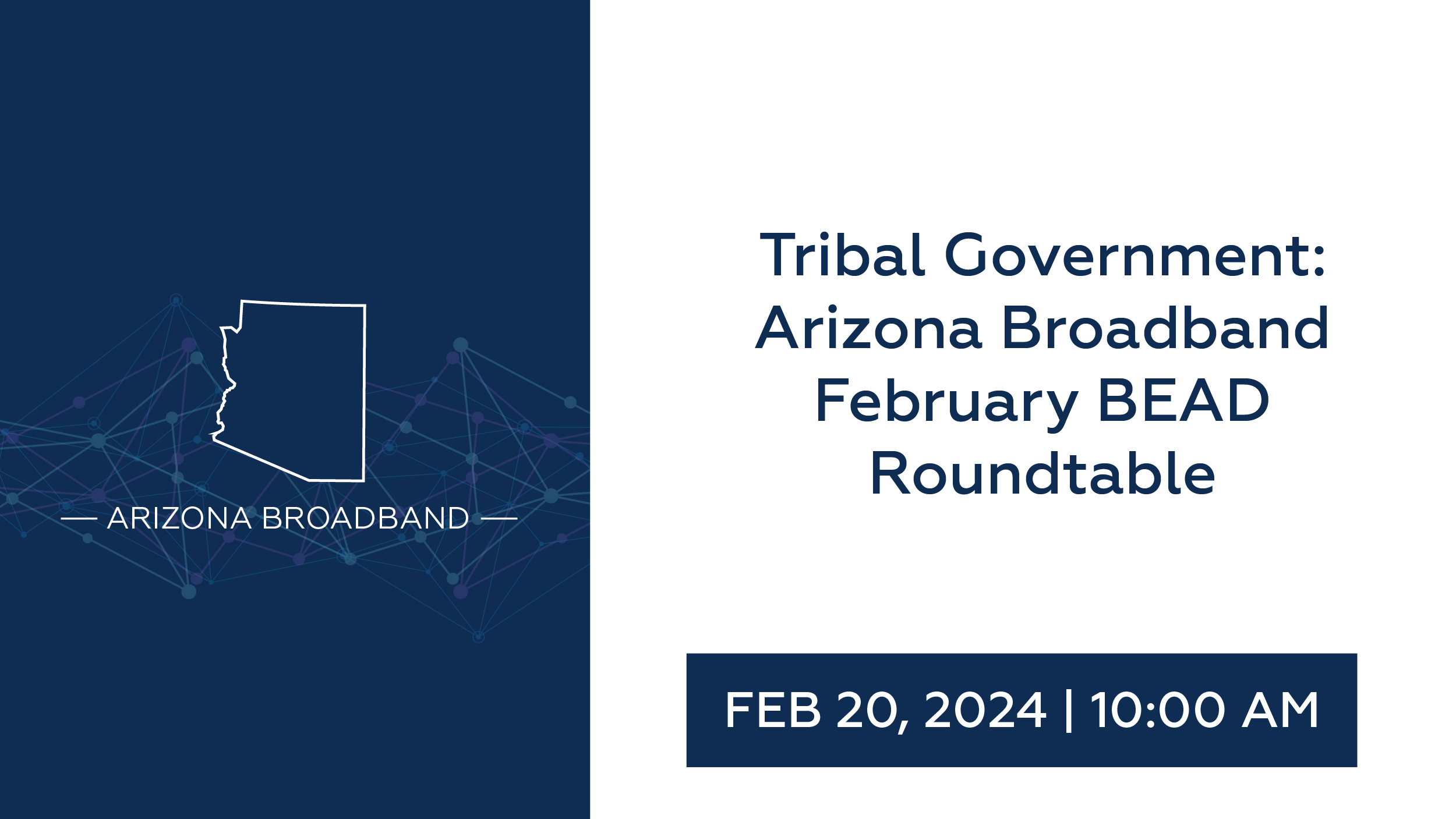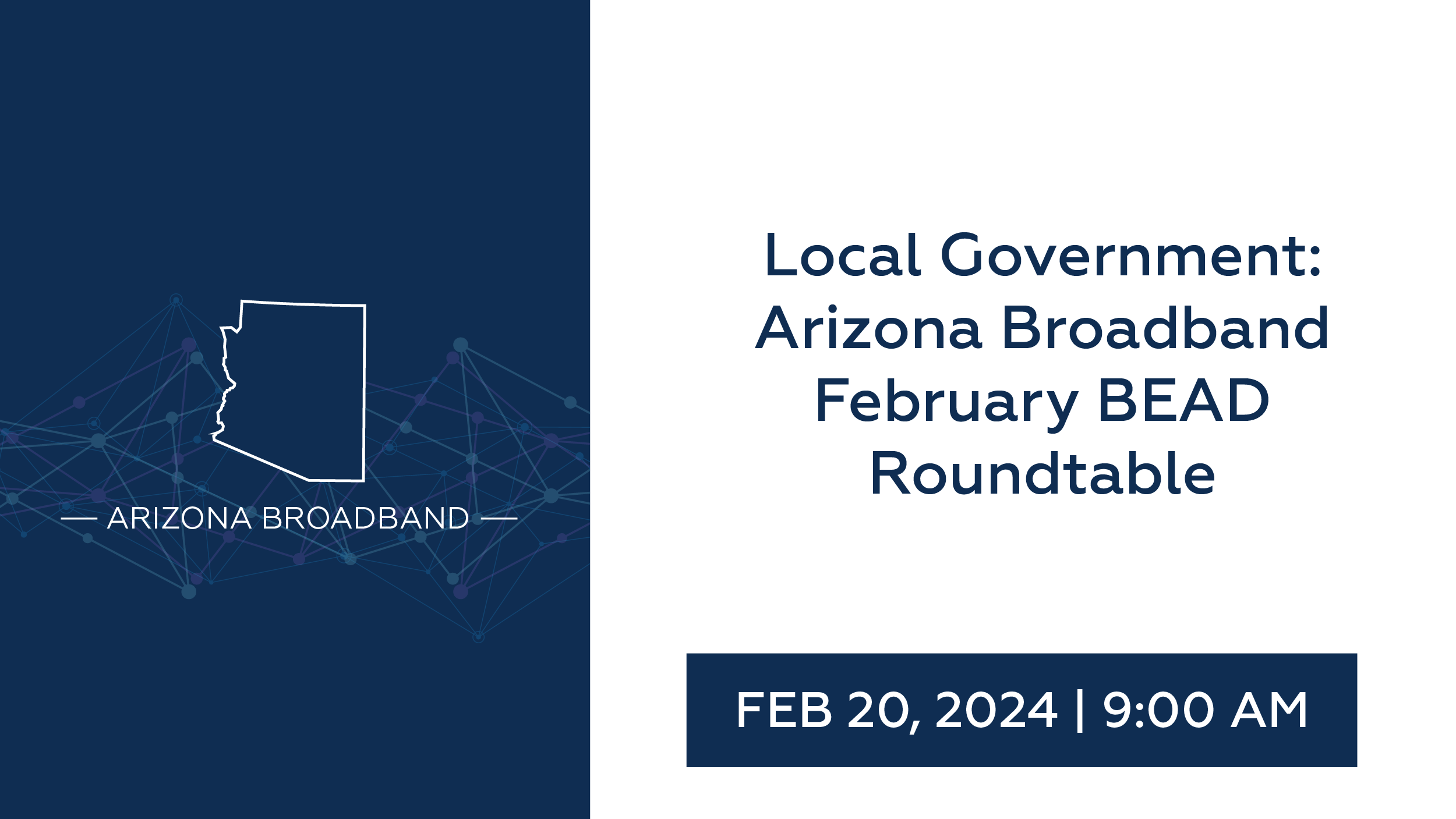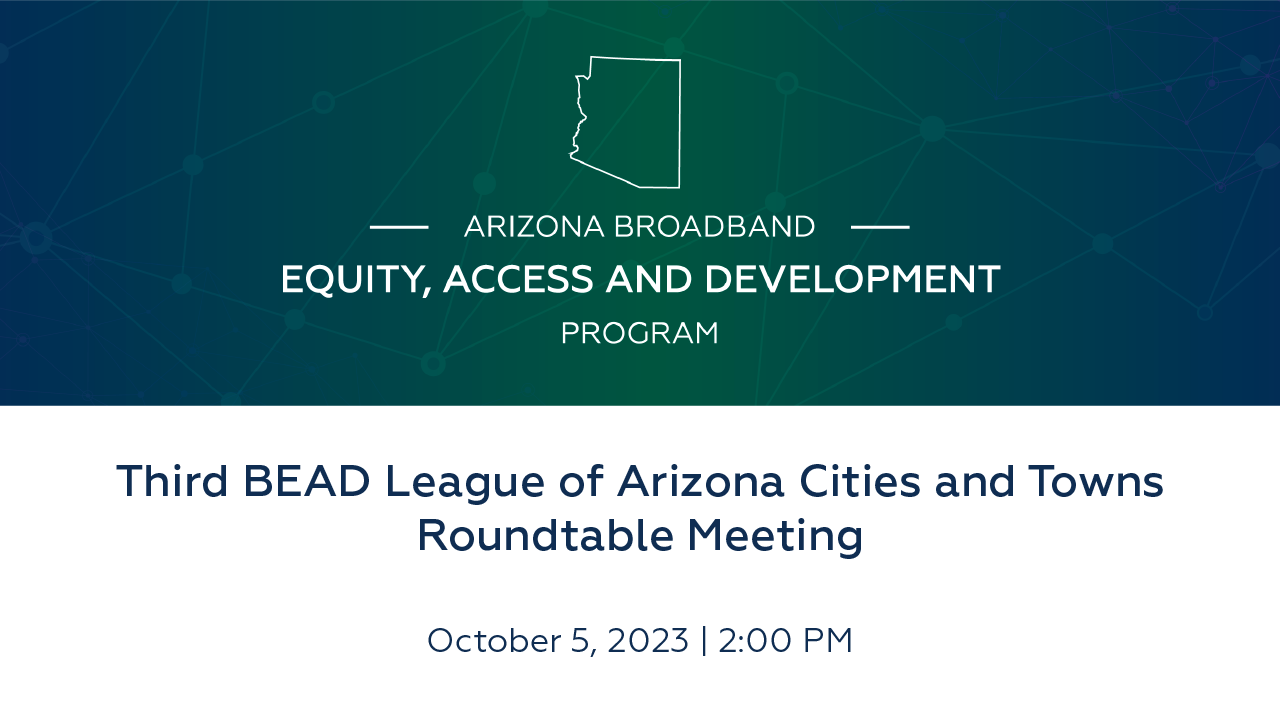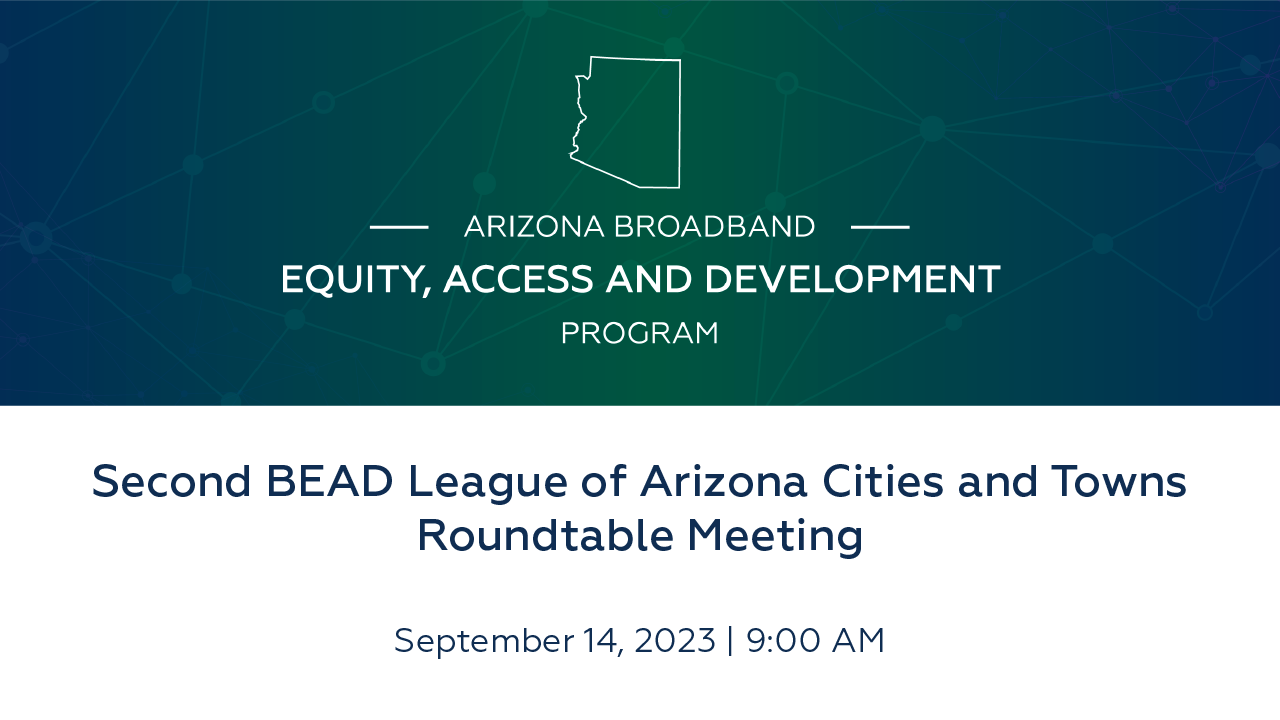
Broadband Equity, Access & Deployment Program (BEAD)
Arizona’s Broadband Equity, Access & Deployment (BEAD) Program represents the state’s largest broadband investment in history with the principal objective of universal broadband for all. BEAD prioritizes unserved and underserved households to improve connectivity, support economic growth, enhance education and improve health care access throughout Arizona. The goals under the BEAD Program are:
BEAD Timeline
The Round 1 Subgrantee Application window is closed, Round 2 Application window will open June 3, 2025. Pre-registration is required to participate in the subgrantee application process. Learn more.
Application Timeline
Round 1
- Round 1 Application Intake: January 6, 2025 – March 7, 2025 - Completed
- Round 1 Project Application Review and Negotiation March 10, 2025 – May 13, 2025
Round 2
- Round 2 Application Intake: June 3, 2025 – July 3, 2025
- Round 2 Project Application Review and Negotiation July 5, 2025 – September 5, 2025
In accordance with the BEAD program requirements, the Arizona State Broadband Office intends to complete its deployment by 2030.
NOTE: This timeline is tentative, pending NTIA approval. This timeline may differ from previous and existing publicly posted information from ACA.

BEAD Five-Year Action Plan
Arizona Governor Katie Hobbs’ vision is to provide dependable and affordable high-speed internet services to every community and access to the necessary digital skills, so every resident can full participate in a digital world. The Arizona State Broadband Office has developed the BEAD Five-Year Action Plan to serve as a guide to identify and deploy the state's historic broadband investment.
BEAD Five-Year Action Plan Goals
The state is committed to providing universal broadband for all. The BEAD Five-Year Action Plan outlines the following goals under the BEAD Program.
INFRASTRUCTURE INVESTMENTS:
- Align broadband infrastructure with healthcare, education, public safety and economic development.
- Use state and federal programs to ensure 100↓ / 20↑ Mpbs Internet Service.
- Collaborate with universities and colleges to expand broadband.
UNIVERSAL CONNECTIVITY:
- Provide high-speed internet to all households, businesses, institutions and Tribal Nations.
- Identify areas lacking 100↓ / 20↑ Mpbs Internet Service.
- Address barriers to broadband expansion.
- Simplify permitting and right-of-way processes.
- Invest in new broadband infrastructure.
21ST-CENTURY WORKFORCE:
- Create workforce programs focusing on technology and high-wage jobs.
- Partner with educational institutions to prepare students for tech jobs.
- Offer reskill and upskill programs for displaced workers.
AFFORDABLE INTERNET:
- Promote affordable internet plans for low-income households.
- Encourage programs that reduce internet costs, like the Affordable Connectivity Program (ACP).
- Foster market competition and incentivize service to underserved areas.
DIGITAL EQUITY AND INCLUSION:
- Increase digital skills and device access for all residents, including Tribal members.
- Strengthen partnerships to improve digital equity programs.
- Promote digital literacy and affordable device access.
- Maintain a public Digital Equity Asset Inventory.
BEAD Initial Proposal
BEAD Initial Proposal Volume I
The Arizona State Broadband Office released for public comment Volume I and II of the BEAD Initial Proposal. Volume I outlines existing broadband funding within Arizona and the list of the locations designated as unserved and underserved in the FCC National Broadband Map, Arizona's Community Anchor Institutions (CAIs) as defined by the National Telecommunications and Information Administration (NTIA) and the proposed plan for the BEAD challenge process.
BEAD Initial Proposal Volume II
Volume II outlines the long-term objectives for deploying broadband, closing the digital divide, addressing access, affordability, equity, and adoption issues, and enhancing economic growth and job creation including information developed in the Five-Year Action Plan.
The BEAD Challenge Process
Arizona was awarded $993.1 million in federal funding to build infrastructure and expand internet access in rural and historically underserved communities. BEAD funds will be prioritized in the following order:
- Connect unserved locations (available service is 25/3 Mpbs per second or less)
- Connect underserved locations (available service is at least 25/3 Mpbs but less than 100/20 Mbps)
- Connect Community Anchor Institutions (CAIs) to gigabit symmetrical service (1,000/1,000 Mpbs)
The BEAD Program requires that the State Broadband Office allow stakeholders to challenge the accuracy of BEAD-eligible locations. Confirmation of locations that currently lack access to high-speed internet is essential for funding to be used to connect these areas. The Challenge Process provides an opportunity to correct inaccuracies in Arizona’s broadband map, ensuring it reflects the most up-to-date broadband access across the state.
On December 12, 2024, the National Telecommunication and Information Administration (NTIA) approved the State Broadband Office's Challenge Process data resulting in the final list of locations and Community Anchor Institutions (CAIs) eligible for BEAD funding.
The BEAD Challenge Resources
Per the NTIA guidelines, only the following entities can submit challenges:
- Local governments
- Tribal nations and communities
- Nonprofit organizations
- Internet Service Providers (ISPs)
CHALLENGE PROCESS FILES:
Datasets that are used to support the BEAD Challenge Process
- Unserved
- Underserved
- Community Anchor Institutions
- Initial Proposal Volume 1 Approved by NTIA
- NTIA - Arizona State and Federal Deduplication
- NTIA - State and Federal Deduplication Data Dictionary
- Bulk Challenge Template
- CAI Template
CHALLENGE PROCESS INFORMATION MATERIALS:
Documents that provide an overview of the challenge process and how to participate
- Overview of the Challenge Process
- Overview of Area and MDU Challenges
- How to Conduct a Speed/Latency Test
- Steps to Report a Service Issue
- NTIA BEAD Challenge Process Policy
- BEAD Model Challenge Process
- BEAD Notice of Funding Opportunity (NOFO)
- Challenge Types, Evidence Examples, & Permissible Rebuttals
- ACA Challenge Evidence Requirements
- ACA Rebuttal Evidence Requirements
- Rebuttal Reports Data Dictionary
- ACA BEAD Affidavit
- Open Rebuttals (as of June 20, 2024)
- Provider Challenges Awaiting Rebuttal (as of June 17, 2024)
BROADBAND NAVIGATOR USER GUIDE:
A technical document for navigating and interactive with the challenge portal
- Broadband Navigator User Guide (Updated 4/24/2024)
- How to Perform a Broadband Challenge Process Speed Test
REQUEST A COSTQUEST LICENSE
Participating entities are encouraged to request a no-cost NTIA Tier D or Tier E license from CostQuest Associates to participate in the BEAD Challenge Process. However, obtaining a CostQuest license is not required to participate. This license will permit licensees to view the BSL data on a more granular level and is an important tool for analyzing areas that may need to be challenged. Please note that the process to request a license may two up to two weeks to complete.
Review the NTIA Fabric Licensing FAQ to learn about the licensing process and determine the appropriate tier license for your organization.
Tier D
Entities that participate in any federal broadband programs, including entities with reporting requirement or entities that plan to participate in the BEAD sub-granting process, should request a Tier D License. Internet service providers, for example, should request a Tier D license. Licensees will be similar to those with an FCC Fabric Tier 2 license.
Use this guide for requesting an NTIA Tier D to assist in completing the application process.
Tier E
Entities that participate in the challenge process, but do not participate in federal broadband programs, should request Tier E license. Nonprofit organizations, for example, should request Tier E license. Licensees will be similar to those with an FCC Fabric Tier 4 license.
Use this guide for requesting an NTIA Tier E to assist with completing the application process.
BEAD Subgrantee Application
Arizona's BEAD Subgrantee Application process includes two round of applications:
- Round 1 Application Window: January 6, 2025 to March 7, 2025 - Completed
- Round 2 Application window will be open from June 3, 2025 to July 3, 2025
All BEAD Applicants must complete pre-registration prior to submitting an application. Learn more.
Application Timeline
Round 1
- Round 1 Application Window: January 6, 2025 to March 7, 2025 - Completed
- Round 1 Project Application Review and Negotiation: March 10, 2025 – May 13, 2025
Round 2
- Round 2 Application window will be open from June 3, 2025 to July 3, 2025
- Round 2 Project Application Review and Negotiation: July 5, 2025 – September 5, 2025
NOTE: This timeline is tentative, pending NTIA approval. This timeline may differ from previous and existing publicly posted information from ACA.
Application Resources
- Application FAQs (updated 4/07/2025)
- Application Guide (updated 2/13/2025)
- Application Questionnaire
- Application Checklist
- Application Guidance Webinar Deck (updated 2/13/2025)
- Application Guidance Webinar Recording (January 2025)
- Technology Solutions Clarification
- Project Cost Scoring Clarification
- NEW! Draft Subgrantee Agreement
- NEW! Attachment 8A - Part A1**
- NEW! Attachment 8A - Part A2**
**These templates replace the original templates. New templates were created in response to feedback from BEAD Applicants. Templates were uploaded and provided 02/25/2025 to applicants via email, on the website and in the BEAD Grantor Portal.
Application Webinars
The BEAD Application webinars are intended for potential applicants applying for Arizona's BEAD Program subgrant. The agenda includes an overview of the BEAD Program, an explanation of the Application process, and instructions for how to submit an application. These sessions will include a provision for questions-and-answer segment.View Webinars
Final BEAD Project Areas
The State Broadband Office conducted the BEAD Project Area Market Sounding exercise from September 23, 2024 to November 7, 2024. During this period, feedback was collected on draft project areas from all Stakeholders. The State Broadband Office thoroughly reviewed all feedback and adjusted some of the draft project areas to ensure that all BEAD-eligible locations are served.
Additional files are also available for download that include project area PDFs and Final Project Area Polygon files:
Approved Challenge Process Dataset
On December 12, 2024, the National Telecommunication and Information Administration (NTIA) approved the State Broadband Office's Challenge Process data resulting in the final list of locations and Community Anchor Institutions (CAIs) eligible for BEAD funding.
The BEAD Market Sounding Exercise
Arizona was awarded $993.1 million in federal funding to build infrastructure and expand internet access in rural and historically underserved communities. BEAD funds will be prioritized in the following order:
- Connect unserved locations (available service is 25/3 Mpbs per second or less)
- Connect underserved locations (available service is at least 25/3 Mpbs but less than 100/20 Mbps)
- Connect Community Anchor Institutions (CAIs) to gigabit symmetrical service (1,000/1,000 Mpbs)
The BEAD Marketing Sounding Exercise, which will run for 45 calendar days from 9/23/2024 to 11/7/2024, was designed is to solicit feedback on the Initial Project Area draft for the BEAD Program, ensuring it aligns with the connectivity needs of all Arizona communities. Through gathering input, the State Broadband Office seeks to make any necessary adjustments to better serve the goal of improving internet access across the state.
The BEAD Market Sounding Exercise is not a requirement of NTIA, but a commitment by the State Broadband Office to continually ensure transparency and feedback loops throughout the BEAD Program.
BEAD Eligible Subgrantees may participate, which includes local governments, nonprofit organizations, tribal nations and communities, and Internet Service Providers (ISPs). These participants are invited to comment on the Initial Project Area Draft as registered users in the
Arizona Broadband Navigator.
BEAD Market Sounding Resources
- Frequently Asked Questions (FAQs)
- Arizona Broadband Navigator User Guide
- Arizona Broadband Navigator
- PENDING Post Challenge CAIs
- PENDING Post Challenge Locations
- Project Area Polygons GeoJSON
- Post-Challenge Data Dictionary
Please note that the ‘pending’ links above are not final. In curing, each data update uses newer FCC maps for true-up and deduplication, which slightly impacts the results. The final list of BEAD-eligible locations will be posted after NTIA approval is received.
BEAD Webinars
Designed as virtual roundtable discussions for Tribal Communities, Local Government and Internet Services Providers, these regular webinars help the Arizona Commerce Authority engage with communities, answer questions about BEAD and highlight any new policies.
